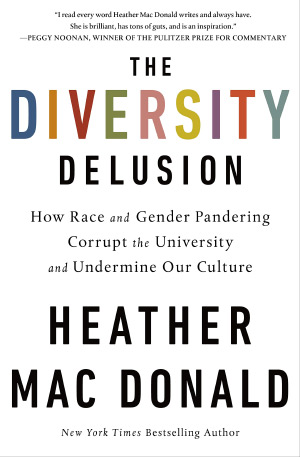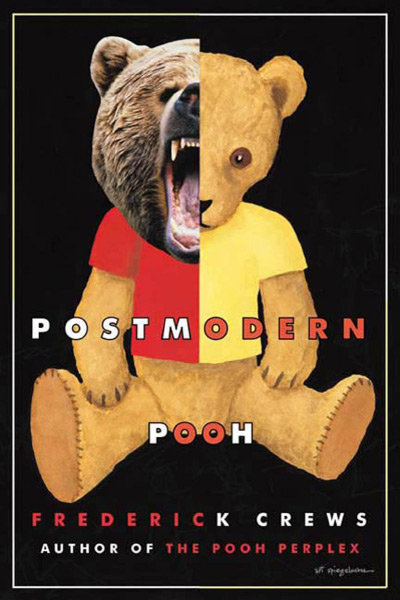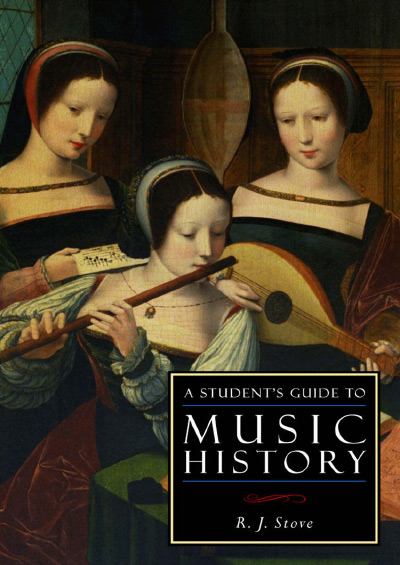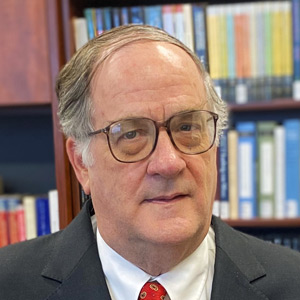Part three of three of the series Recommended Readings on Education.
Part One: K-12 Education: Policy Analysis and Reform
Part Two: K-12 Education: Subject Matter, Curriculum, and Teaching Methods
American colleges and universities have been facing major challenges for years: inadequate student achievement, graduates ill-prepared to meet employers’ needs, high costs, a broken federal student loan program, falling enrollments, declining public support, and a rising number of school closures.
Although the cracks are increasingly apparent for all to see, the causes are usually out of public view and long in the making. The following bibliography includes a wide range of issues and insights on topics such as the incentives and constraints of higher education; racial preference in hiring and admissions; politicization and cancel culture restrictions on speech; tenure; fraud and misconduct in research; adjudicating sexual assault cases on campus; "reform" calculus; the decline of traditional liberal arts education; and more.
If the dons of higher education aren’t willing and able to put in effect the reforms necessary to improve matters, it’s incumbent on alumni and the general public to exert appropriate pressure. This bibliography, is a project of the Independent Institute’s Center on Educational Excellence, it can serve as a springboard for fruitful discussion, and will be expanded and refined as important new scholarship and analyses come to light. Please send us your suggestions for future iterations, and share the list with others to encourage their feedback.
If you can read just one item on this list, then make it Restoring the Promise, by Richard Vedder. If you can read only two, make your second Cracks in the Ivory Tower, by Jason Brennan and Phillip W. Magness.
“Academic Tenure: A Law and Economic Analysis,” by Robert W. McGee and Walter E. Block, Harvard Journal of Law and Public Policy, Vol. 14, No. 2 (Spring 1991), pp. 545-563. Reprinted in Academic Freedom and Tenure: Ethical Issues, ed. Richard T. DeGeorge, Rowman & Littlefield, 1997, pp. 156-175.
In the article, the authors write: Tenure “increases overall costs, decreases flexibility, disenfranchises the paying consumer of education, increases dependence on unaccountable insiders, and makes it nearly impossible to remove incompetent and unnecessary professors. ... “The education industry ... is virtually insulated from competition. Although colleges and universities compete for students, various accreditation agencies and governments dictate much of what they can and cannot do. Colleges and universities cannot compete freely by offering a product that is radically different from what other similar institutions are offering because they must meet the requirements of the accreditation agencies and government regulators, or risk having their accreditation revoked. The insulation from competition in the education industry, and the resulting ability of many educational institutions to survive without being flexible, allows the tenure system to survive.”
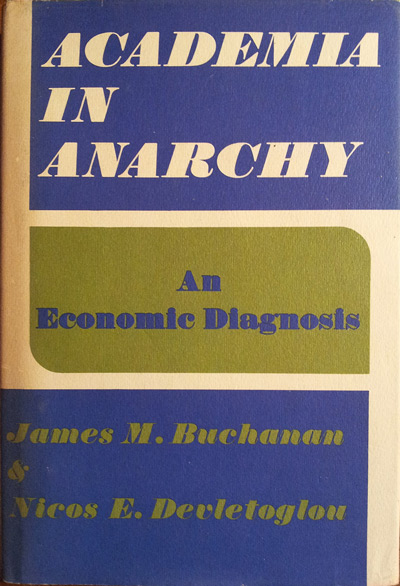 Academia in Anarchy: An Economic Diagnosis, by James M.Buchanan and Nicos E. Devletoglou. Basic Books, 1970.
Academia in Anarchy: An Economic Diagnosis, by James M.Buchanan and Nicos E. Devletoglou. Basic Books, 1970.
Nobel prize winning economist James M. Buchanan along with Nicos Devletoglou discuss members of the faculty at institutions of higher education as “producers who do not sell” (but get to decide what classes are offered), taxpayers as “owners who do not control” (in the case of public universities), and boards of regents as “governing boards that do not govern” (instead rubber-stamp what the administration offers). The authors argue against the movement towards free tuition using a public-choice analysis.
The authors write, “The interposition of the government between the universities and their student-consumers has created a situation in which the universities cannot meet demand and tap directly resources for satisfying student-consumer preferences. In order to get resources, universities have to compete with other tax-financed activities (armed forces, lower schools, welfare programs, and so forth). In the process, student-consumer demand is neglected, and the resulting student unrest provides the ingredients for the chaos we observe.
“An obvious contrast here would be a situation in which universities might be competitors for resources in the style of publishers or automobile manufacturers. Universities would then compete for students in order to obtain their finance, instead of obtaining their finances from the government and then making students compete for a limited number of places. They would then have to put their emphasis on satisfying their customers or explaining to them why they ought to be satisfied. In fact, if every university were so obliged to live by the verdicts which the community would express in terms of the use made of their goods and services, the education industry might cease to have many of today’s reasons for disintegrating.
“In this light, the ‘unbelievable’ turmoil and dismal nonsense engulfing the contemporary university world [in the 1960s] becomes partially understandable. On balance, the elimination of this chaos may, by implication, require some shift toward greater interuniversity competition which would embody more usage of market-type adjustments. The mounting dependence on government financial support, as this has been translated into the institution of free tuition, may itself be one significant source of current unrest.”
“The Academic Truce Has Crumbled,” by Phillip W. Magness. Daily Economy blog, American Institute for Economic Research, January 21, 2020.
Magness writes, “In the 1970s and 1980s the tension [between fiscal oversight by state legislatures and faculty autonomy with regard to course content at public colleges and universities] largely gave way to something of an informal truce between its main political contestants.
The academic left acknowledged that the unimpeded content freedom it desired for itself also applied to the minority of faculty hailing from other perspectives, including conservatives and libertarians. And the political right largely backed off the strategy of pressuring trustees to rein in the activist excesses of their institutions and curriculum, lest universities face stricter oversight tied to appropriations. The university system settled into a relatively stable distribution of political content. A clear plurality of the faculty leaned left, to be sure, and openly identified as such in surveys. But faculty from the center and right sides of the spectrum also carved out stable minority stakes in most disciplines. There are many signs today, however, that the truce is crumbling.
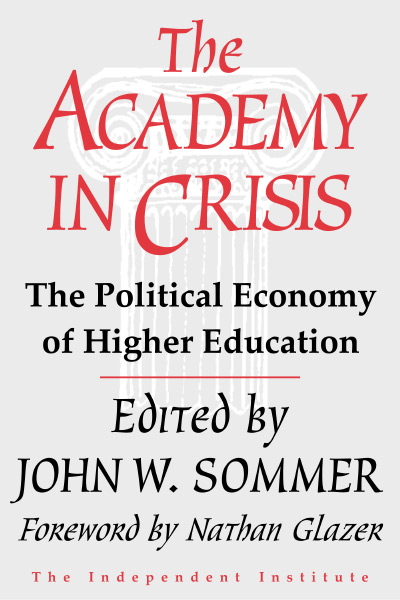 The Academy in Crisis: The Political Economy of Higher Education, edited by John W. Sommer, foreword by Nathan Glazer. Transaction Publishers for the Independent Institute, 1995.
The Academy in Crisis: The Political Economy of Higher Education, edited by John W. Sommer, foreword by Nathan Glazer. Transaction Publishers for the Independent Institute, 1995.
The Independent Institute’s synopsis reads, “[Relative to primary and secondary education we] sometimes overlook the government’s equally immense involvement in higher education. ... The Academy in Crisis directs a piercing beacon at the government’s pervasive role in colleges and universities.
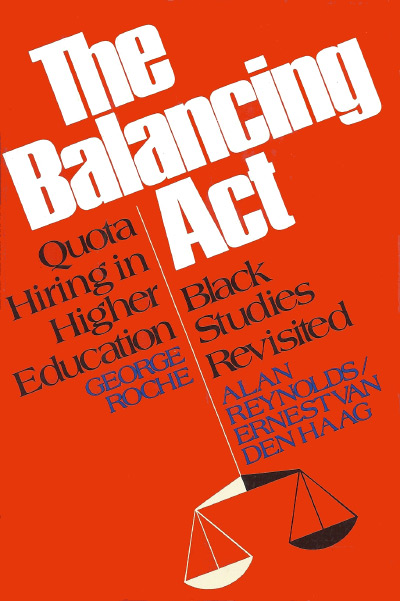 The Balancing Act: Quota Hiring in Higher Education, by Alan Reynolds and George C. Roche. Open Court, 1974.
The Balancing Act: Quota Hiring in Higher Education, by Alan Reynolds and George C. Roche. Open Court, 1974.
The authors discuss how Health, Education and Welfare affirmative action resulted in a bureaucratic nightmare leading to racial discrimination and lower employment standards.
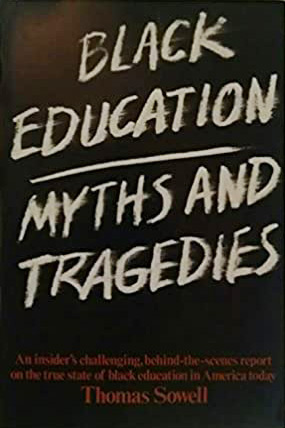 Black Education: Myths and Tragedies, by Thomas Sowell. David McKay Company, 1972.
Black Education: Myths and Tragedies, by Thomas Sowell. David McKay Company, 1972.
The Kirkus review says, “Sowell maintains that putting ill-prepared blacks, especially from the ghetto, into a high-pressure situation at top universities creates destructive frustrations and catalyzes self-consolatory militant separatism; but to compensate with black studies programs full of soft courses and lower standards is to cheat the student. This view is elaborated at circumstantial length, especially with reference to the 1969 Cornell upheavals. Sowell is severe toward those black administrators and teachers who in his view cover their mediocrity by playing campus politics and by spouting the rhetoric of blackness. He further argues that many able, industrious black students are being discriminated against by recruiters searching for the more ‘underprivileged’ albeit less gifted and he decries the tendency to dismiss working-class black families as ‘middle-class.’”
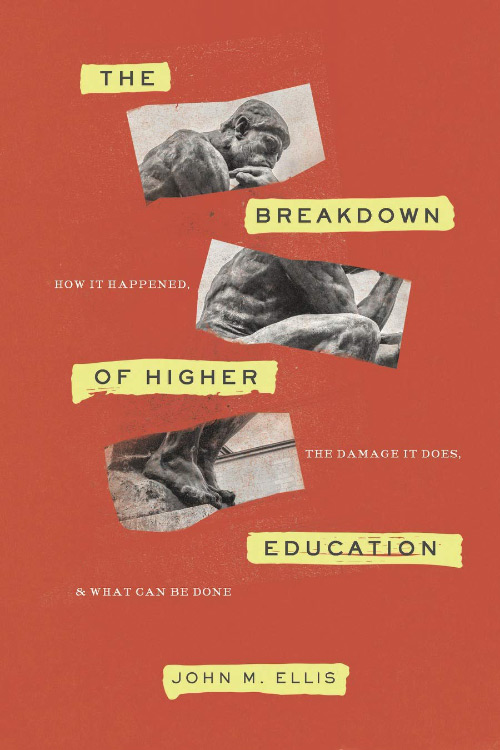 The Breakdown of Higher Education: How It Happened, the Damage It Does, and What Can Be Done, by John M. Ellis. Encounter Books, 2020.
The Breakdown of Higher Education: How It Happened, the Damage It Does, and What Can Be Done, by John M. Ellis. Encounter Books, 2020.
Encounter Books writes, “Ellis shows that political motivation is always destructive of higher learning. Even science and technology departments are not immune. The corruption of universities by radical politics also does wider damage: to primary and secondary education, to race relations, to preparation for the workplace, and to the political and social fabric of the nation. Commonly suggested remedies—new free-speech rules, or enforced right-of-center appointments—will fail because they don’t touch the core problem, a controlling faculty majority of political activists with no real interest in scholarship.”
Heather Mac Donald writes, “America’s public universities are engaged in large-scale theft, observes John Ellis trenchantly: They fraudulently divert funds appropriated for education to the improper purpose of political indoctrination. Private colleges are no less deceptive about their activities, holding themselves out as disinterested purveyors of skills and knowledge while inculcating in students a hatred of Enlightenment values and the American project. Ellis plumbs the history that corrupted the country’s once peerless colleges and universities. ...”
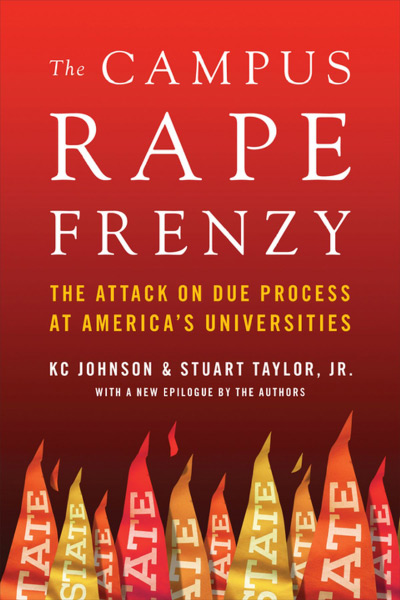 The Campus Rape Frenzy: The Attack on Due Process at America’s Universities, by K.C. Johnson and Stuart Taylor. Jr. Rev. ed., Encounter Books, 2018.
The Campus Rape Frenzy: The Attack on Due Process at America’s Universities, by K.C. Johnson and Stuart Taylor. Jr. Rev. ed., Encounter Books, 2018.
The new Epilogue in the paperback edition relates the events have transpired since this book was first published in October 2016. Nadine Strossen writes, “This book is a must read for every feminist—and everyone else—who cares about civil liberties. It of course recognizes that campuses must vigorously protect actual and potential sexual assault victims. But it demonstrates vividly and readably that the too-prevalent secretive campus star chambers are the worst of both worlds: innocent students are too easily railroaded out of college, effectively destroying their educational and career opportunities; but actual rapists can at most be expelled, leaving them free to prey on further victims beyond the campus. That is why many advocates of victims’ rights, as well as advocates of the rights of the accused, concur that the fairest and most effective way to handle campus sexual assault cases is through the criminal justice system. The book also highlights how the federal Department of Education has abused its power by bypassing lawful rule-making processes and strong-arming campuses to abandon the presumption of innocence and due process rights of students accused of sexual assault and harassment.”
William P. Barr writes, “In this masterful account, Johnson and Taylor examine in detail how President Obama’s Education Department—promulgating regulations beyond its statutory authority, invoking erroneous data, and fanning the false narrative of a ‘rape culture’ on college campus—has created a regime of kangaroo justice. Male students accused of sexual misconduct are found guilty, and their lives destroyed, by campus panels operating without any semblance of due process and all too frequently on the basis of grossly inadequate information. Your blood will boil as the authors meticulously examine scores of cases where, in the name of political correctness, male students are sacrificed to the mob with academic leaders happily serving as the hangmen.”
“Can Poetry Matter?”, by Dana Gioia. The Atlantic, May 1991.
Gioia writes, “Once poets began moving into universities, they abandoned the working-class heterogeneity of Greenwich Village and North Beach for the professional homogeneity of academia. ... Writers fashioned their academic specialty in the image of other university studies. As the new writing departments multiplied, the new professionals patterned their infrastructure—job titles, journals, annual conventions, organizations—according to the standards not of urban bohemia but of educational institutions. Out of the professional networks this educational expansion created, the subculture of poetry was born. ...
“[A] clear-eyed observer must also recognize that ... by employing writers to do something other than write, institutions have changed the social and economic identity of the poet from artist to educator. In social terms the identification of poet with teacher is now complete. The first question one poet now asks another upon being introduced is ‘Where do you teach?’ The problem is not that poets teach. The campus is not a bad place for a poet to work. It’s just a bad place for all poets to work. Society suffers by losing the imagination and vitality that poets brought to public culture. Poetry suffers when literary standards are forced to conform with institutional ones.”
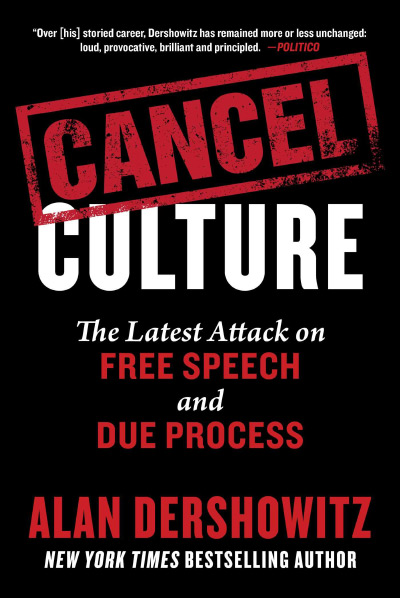 Cancel Culture: The Latest Attack on Free Speech and Due Process, by Alan Dershowitz. Skyhorse Publishing, 2020.
Cancel Culture: The Latest Attack on Free Speech and Due Process, by Alan Dershowitz. Skyhorse Publishing, 2020.
For our purposes, the most relevant parts of this book are chapters 1 and 5, “Canceling Freedom of Speech for Thee, But Not for Me!” and “Canceling Meritocracy.” Retired Harvard law professor Dershowitz writes, “The students who claim to ‘feel unsafe’ are referring to ideas, not [actual weapons pointed at them]. But ideas are never safe, nor should they be on university campuses. Students who are, or claim to be, frightened by hostile ideas must develop thicker skins or select a different venue for learning. They must not be allowed to use their claimed fear as a weapon to censor views they abhor. This censorial tactic ... is used primarily by the hard-left to censor speakers of the right and center. ...
“[Opponents of meritocracy] reject the verdict of experience that meritocratic evaluations are often most beneficial to the poor, the non-privileged, and those without elite contacts and influence. Blind grading ... allows hard-working non-elites to rise to the top. ...
“[N]ever ... have I heard many progressives or woke zealots seek more Roman Catholics, Christian fundamentalists, gun advocates, or opponents of affirmative action to diversify student bodies or faculties at universities. The demand for diversity is often a euphemism for more of those the demanders want and fewer of those they don’t want.”
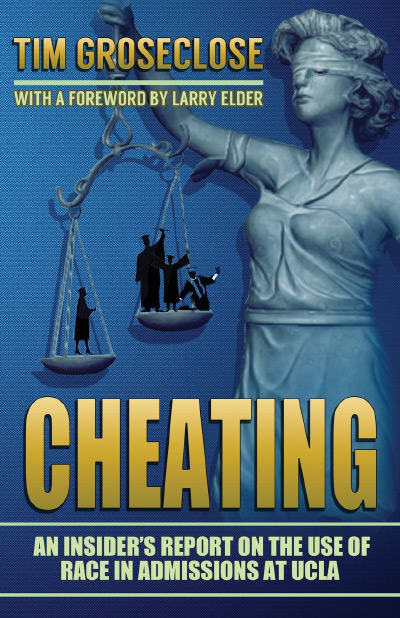 Cheating: An Insider’s Report on the Use of Race in Admissions at UCLA, by Tim Groseclose. Dog Ear Publishing, 2014.
Cheating: An Insider’s Report on the Use of Race in Admissions at UCLA, by Tim Groseclose. Dog Ear Publishing, 2014.
Dog Ear Publishing: “Because of California’s Proposition 209, public universities such as UCLA cannot use race as a factor in admissions. However, as this book shows, UCLA gives significant preferences to African Americans, while it discriminates against Asians. The author, [then] a professor of political science and economics at UCLA, documents what he witnessed as a member of UCLA’s faculty oversight committee for admissions.
“[Groseclose] also describes findings from a UCLA internal report as well as statistics from a large data set that he has posted online. All show that UCLA is breaking the law. The discrimination is not simply a byproduct of class-based preferences. For instance, for one aspect of the admissions process, a rich African American’s chance of admission is almost double that of a poor Asian, even when the two applicants have identical grades, SAT scores, and other factors.” Groseclose makes social-science concepts readily understandable.
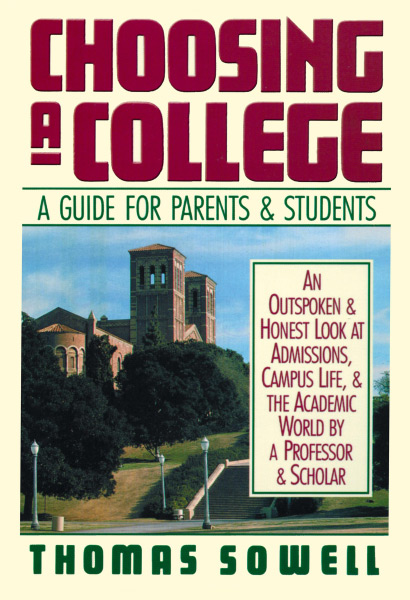 Choosing a College: A Guide for Parents and Students, by Thomas Sowell. Blackwell Publishing, 1997.
Choosing a College: A Guide for Parents and Students, by Thomas Sowell. Blackwell Publishing, 1997.
What questions should prospective students and their parents ask when choosing a higher education institution? Sowell gives a clear guidance on what to look for and what not to look for, including special programs, academic environment, et al.
Tim Groseclose writes that Sowell describes a phenomenon that Sowell calls the “mismatch effect.” Groseclose continues, “According to the effect, if students are less prepared for a particular level of instruction, ... then, not only do they make worse grades than their peers, they actually learn less than they would have learned if they had attended a less challenging school.
“Because of this effect, Sowell offered some surprising advice. ... He suggested that students should not necessarily go to the best college to which they are admitted. Rather, they should go to a college at which their SAT scores are near the average of the college.”
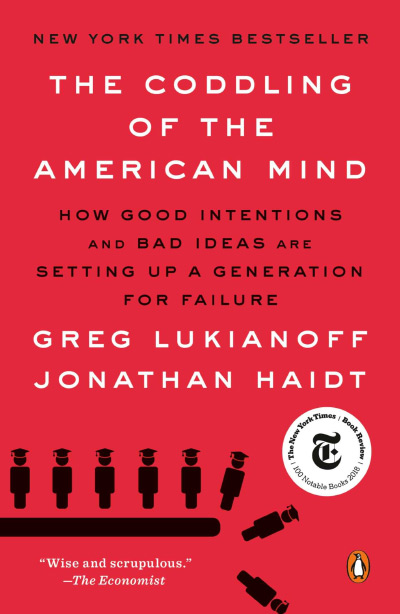 The Coddling of the American Mind: How Good Intentions and Bad Ideas Are Setting Up a Generation for Failure, by Greg Lukianoff and Jonathan Haidt. Penguin Press, 2019.
The Coddling of the American Mind: How Good Intentions and Bad Ideas Are Setting Up a Generation for Failure, by Greg Lukianoff and Jonathan Haidt. Penguin Press, 2019.
The Publisher’s Weekly writes “In this expansion of their 2015 piece for the Atlantic, Lukianoff and Haidt argue that the urge to insulate oneself against offensive ideas has had deleterious consequences, making students less resilient, more prone to undesirable ‘emotional reasoning,’ less capable of engaging critically with others’ viewpoints, and more likely to cultivate an ‘us-versus-them’ mentality. ... The path they advocate—take on challenges, cultivate resilience, and try to reflect rather than responding based solely on initial emotional responses—deserves consideration.”
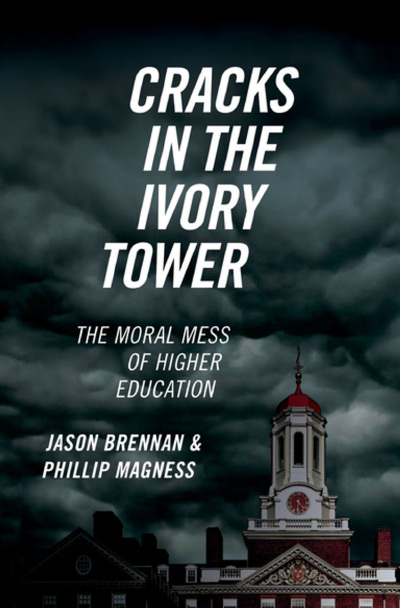 Cracks in the Ivory Tower: The Moral Mess of Higher Education, by Jason Brennan and Phillip W. Magness. Oxford University Press, 2019.
Cracks in the Ivory Tower: The Moral Mess of Higher Education, by Jason Brennan and Phillip W. Magness. Oxford University Press, 2019.
A data-rich investigation on how perverse incentives lead to institutions underperforming when it comes to imparting skills and knowledge to their students. Aeon J. Skoble says, “In general, Brennan and Magness think that we can understand the causes of most of what we complain about if we understand the way incentives matter to people’s decision‐making. ... The role of incentives is one example; another is the reality of trade‐offs. Since every dollar of the university’s budget that is spent on Thing One is therefore not available to be spent on Thing Two, the justification for Thing One has to involve more than just ‘it would be good,’ but furthermore that it’s a better use of funds than Thing Two. And the same is true with respect to government funding for higher ed—every dollar spent on higher ed is a dollar not spent on, e.g., health care. Are the trade‐offs worth it? How would one know? ... Brennan and Magness do a thorough job showing why the problem isn’t ‘increased corporatization,’ ‘neoliberal ideology,’ ‘massive funding cuts,’ or several other bugbears.”
“Crash Course: Ethnomathematics,” by Dirk Olin. New York Times Sunday Magazine, Feb. 23, 2003.
The author discusses the views of David Klein, a professor of mathematics with California State University at Northridge. “Klein ... argues that the statistically lower achievements of some female and minority math students have resulted in an overreaction that doesn’t serve their interests. ‘The practical effect,’ Klein says, ‘has been watered-down math books that overemphasize inductive reasoning (like continuing visual patterns), because this is supposed to be good for women and minorities, and de-emphasizing deductive reasoning and mathematical proofs, which is the heart of mathematics, because that supposedly favors white males.
“‘But mathematics is a worldwide monoculture. Look at the chalkboards in math departments at universities all around the world—in Africa, Asia, Europe, Latin America. You will see the same symbols everywhere you go on this planet, except perhaps in colleges of education where fads reign supreme.’ [Klein] says the danger lies in allowing [study of systems of mathematics of previous civilizations and certain traditional cultures] to crowd out fundamentals on which modernity is based. ... Klein says he does spend some class time discussing the math of Mayans, Egyptians and other early civilizations. ‘But ancient techniques and early discoveries in math will not take students very far who want to do something in the modern world with mathematics,’ he says.”
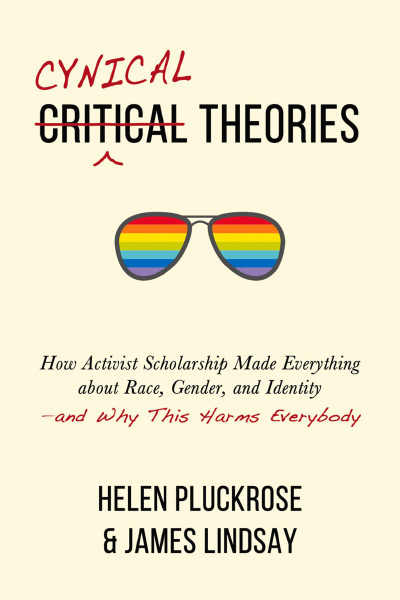 Cynical Theories: How Activist Scholarship Made Everything about Race, Gender, and Identity―and Why This Harms Everybody, by Helen Pluckrose and James Lindsay. Pitchstone Publishing, 2020.
Cynical Theories: How Activist Scholarship Made Everything about Race, Gender, and Identity―and Why This Harms Everybody, by Helen Pluckrose and James Lindsay. Pitchstone Publishing, 2020.
Chapter 5: “Critical Race Theory and Intersectionality” is the most important for our purposes. Pluckrose and Lindsay write, “[C]ritical race Theory sounds rather racist itself. ... We are told racism is embedded in culture and that we cannot escape it. We hear that white people are inherently racist. We are told that ... only white people can be racist. We are informed that only people of color can talk about racism, that white people just have to listen. ... We hear that ... being color-blind is, in fact, racist. ...
“In the real world, attempting to ‘respect’ all marginalized identities at once, as unique voices with the inherent, unquestionable wisdom connected to their cultural groups, can produce conflict and contradiction. We saw [an example] of this when the lifelong human rights campaigner Peter Tatchell was accused of racism for criticizing black rap musicians who sang about murdering gay people. ...
“[B]y focusing so intently on race and by objecting to ‘color-blindness,’ ... critical race Theory threatens to undo the social taboo against evaluating people by their race. Such an obsession with race, combined with a critique of liberal universalism and individuality ... is not likely to end well ... for minority groups. ...”
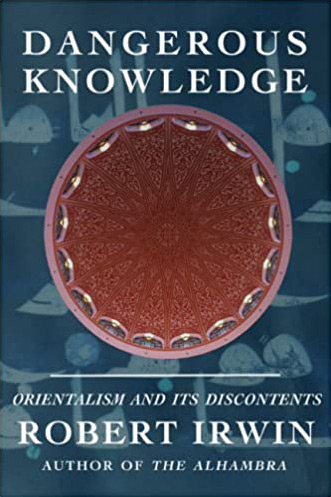 Dangerous Knowledge: Orientalism and Its Discontents, by Robert Irwin. Overlook Press, 2006.
Dangerous Knowledge: Orientalism and Its Discontents, by Robert Irwin. Overlook Press, 2006.
This volume by the Middle East editor of the Times Literary Supplement is a critique of Edward Said’s Orientalism. Wikipedia: Irwin “maintains that Said focused his attention on the British and French in his critique of Orientalism, while it was German scholars who made the original contributions. He notes that Said linked the academic Orientalism in those countries with imperialist designs on the Middle East, yet, by the 19th and the early 20th centuries, it was more proper to regard Russia as an empire having imperialist designs on the Caucasus region and Central Asia. Irwin maintains that the issue of Russia’s actual imperialist designs is avoided by Said. Another of Irwin’s key points is that oriental scholarship, or ‘Orientalism,’ ‘owes more to Muslim scholarship than most Muslims realize.’”
Irwin has said elsewhere, "I am a medievalist, but [Edward Said] hates the Middle Ages. Altogether he loathes the past, he does not have the ability to enter into the spirit of other ages. He lies about European novelists and twists their words; I am myself a novelist with great sympathy for some of those whom he denounces in his book. Finally, I am an Orientalist, too, and his book is a long and persevering polemic against my subject, so I need to ask: is there anything at all to like in Said’s book?—No. It is written far too quickly and carelessly. It abounds with misprints and misspelled names. It is an extremely polemic book, and throughout time many polemic books for or against Islam and the Muslim world have been written, but none have been taken seriously in the same way as Said. ... The fact is that researchers cannot build anything on [the dead end of] Said’s thoughts. ... He has made it difficult for Westerners to say anything critical about Islam and the Muslim world. You cannot do that because then you run the risk of getting denounced as an Orientalist, i.e. a racist, an imperialist and other terrible things.”
“The Distribution of Costs and Direct Benefits of Public Higher Education: The Case of California,” by W. Lee Hansen and Burton A. Weisbrod. Journal of Human Resources, vol. 4, no. 2 (Spring 1969): 176 –191.
This pioneering article pointed out that people who go to college do well in life financially but their education in public colleges is paid for by regular taxpayers, who aren’t doing as well.
The Diversity Delusion: How Race and Gender Pandering Corrupt the University and Undermine Our Culture, by Heather Mac Donald. St. Martin’s Press, 2018.
Dwight R. Lee’s review reads, “The destructive effects the campus diversity movement she chronicles is having on higher education are obviously disturbing, but so is the fact that so many people who claim to be teaching today’s students critical thinking skills are taking the absurdities of the movement seriously.”
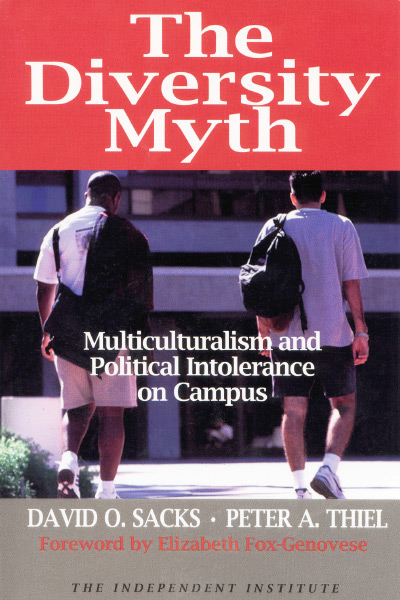 The Diversity Myth: Multiculturalism and Political Intolerance on Campus, by David O. Sacks and Peter A. Thiel. Independent Institute, 1998.
The Diversity Myth: Multiculturalism and Political Intolerance on Campus, by David O. Sacks and Peter A. Thiel. Independent Institute, 1998.
The Independent Institute synopsis reads, “In the name of ‘diversity,’ many leading academic and cultural institutions are working to silence dissent and stifle intellectual life. ... [The authors] trace the connections between such disparate trends as political correctness, the gender wars, Generation X nihilism, and ‘culture wars,’ showing how these have played a role in shaping ‘multiculturalism’ at institutions like Stanford.”
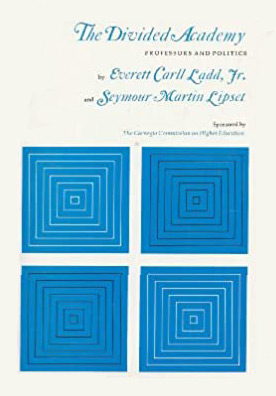 The Divided Academy: Professors and Politics, by Everett Carl Ladd Jr. and Semour Martin Lipset. A Report of the Carnegie Commission on Higher Education. McGraw-Hill, 1975.
The Divided Academy: Professors and Politics, by Everett Carl Ladd Jr. and Semour Martin Lipset. A Report of the Carnegie Commission on Higher Education. McGraw-Hill, 1975.
Even though this study was written in the mid-1970s, the analytic approach is still valid. And campus turmoil today relating to political correctness, critical race theory, and cancel culture has some similarities to that in the time just after the 1960s. ERIC: “College and university faculty, together with their students, have established a reputation as being among the most liberal-left political groups in the United States. The extent to which that reputation is deserved and reasons why political liberality is so dominant on the nation’s campuses are the subjects of this document. The empirical evidence comes from a national survey in which 60,000 faculty members in more than 300 institutions responded. Variations of political orientation associated with different academic disciplines, age, and religion are also described and analyzed, but the factor found to be most significant in explaining the left-liberal politics of professors is [their membership in the intelligentsia]. Chapters cover: (1) the politics of intellectuals; (2) the ideology of academics: intersections of national and campus affairs; (3) academic disciplines and politics; (4) academic disciplines and politics: the case of the social sciences; (5) class, intellectuality, and academic politics; (6) intellectuality and social background: the liberalism of Jewish academics; (7) the demography of academic politics: age and social background; (8) issues of the 1960s: the era of campus protests; (9) persisting effects of the 1960s: the 1972 presidential election; (10) issues of the 1970s: unionism and the professoriate; and (11) conclusions.”
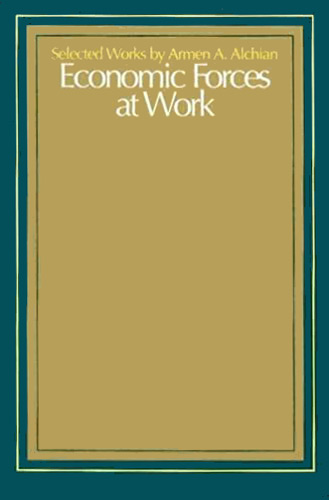 “The Economic and Social Impact of Free Tuition,” by Armen A. Alchian. In his Economic Forces at Work: Selected Works. Liberty Fund, 1977, pp. 203 –226.
“The Economic and Social Impact of Free Tuition,” by Armen A. Alchian. In his Economic Forces at Work: Selected Works. Liberty Fund, 1977, pp. 203 –226.
Economist Alchian describes the shortcomings and counterproductive nature of free tuition, including how it hampers school quality and why free tuition is a subsidy from the poor and middle class to those who will be well-off after college.
“The Effect of Government Subsidies-in-Kind on Private Expenditures: The Case of Higher Education,” by Sam Peltzman, Journal of Political Economy, January-February 1973: 1–27.
The conclusion of the article reads, “American higher education is characterized by extensive subsidies, mostly rendered in kind at state-operated schools. The object of this article has been to estimate the impact of these subsidies on total spending on higher education. ... Specifically, we estimate that, for each dollar now spent by government higher-education institutions, total higher-education expenditures are reduced by at least seventeen cents more than they would be if government subsidies were rendered in money.”
The Fall of the Faculty: The Rise of the All Administrative University and Why It Matters, by Benjamin Ginsberg. Oxford University Press, 2011.
Ginsberg writes, “Disarmed by its own progressive commitments, the faculty has largely been silent as administrators have used the language of diversity and civility to trample on faculty prerogatives and to advance administrative agendas.”
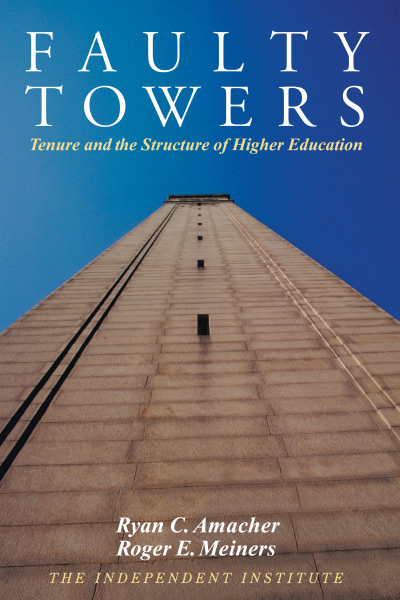 Faulty Towers: Tenure and the Structure of Higher Education, by Ryan C. Amacher and Roger E. Meiners. Independent Institute, 2004.
Faulty Towers: Tenure and the Structure of Higher Education, by Ryan C. Amacher and Roger E. Meiners. Independent Institute, 2004.
The Independent Institute’s overview reads, “Tenured professors who have become incompetent are rarely dismissed, and superior teaching is rarely rewarded, although there is little to prevent universities from doing so. Tough administrators are also hard to find—in part because university trustees seldom hold them accountable. Faulty Towers explains how restructuring university incentives to be more in line with those of market-based enterprises would produce greater accountability, stronger boards of trustees, more effective administrators, and a tenure system that protects academic freedom but not substandard education.”
“Federal Student Loans: A $435 Billion Miscalculation?” by Richard K. Vedder. Forbes.com, November 30, 2020.
Vedder writes, “[T]he reality is that a majority of the [student loan] debt is owed by persons borrowing large sums of money, very often for graduate or professional school, a large portion of whom are living in affluent zip codes earning big salaries from jobs acquired after acquiring loan-assisted M.B.A., law or medical degrees. Blanket full loan forgiveness does not benefit mainly the poor and downtrodden, it disproportionately helps golf-playing purveyors of white privilege driving nice cars. ...”
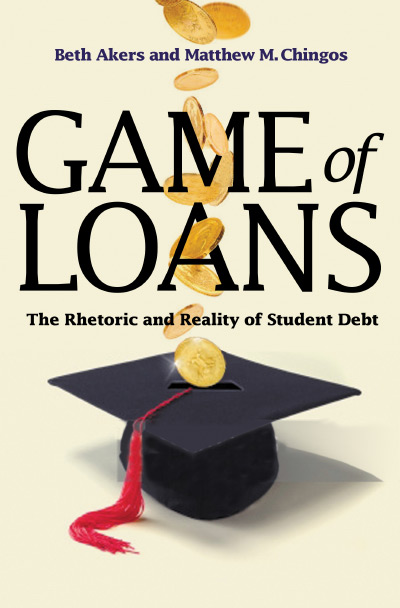 Game of Loans: The Rhetoric and Reality of Student Debt, by Beth Akers and Matthew M. Chingos. Princeton University Press, 2016.
Game of Loans: The Rhetoric and Reality of Student Debt, by Beth Akers and Matthew M. Chingos. Princeton University Press, 2016.
This book is valuable not for the authors’ policy recommendations, but for its full and accurate portrait of the federal student financial-aid program, its showing of the affordability of students’ debt, and it’s showing that universal loan forgiveness would be welfare for the well-to-do.
A Guide to Classical Liberal Scholarship, by Tom G. Palmer. Rev. ed., Institute for Humane Studies, 1994. Download PDF
ERIC: “This booklet introduces students to a wide range of works of classical liberal scholarship. The works described can be used in researching term papers, theses, and dissertations. ... The tradition of classical liberalism reflects the thought of individuals who value peace, individual liberty and freedom of thought, speech, and action. This annotated bibliography provides a brief introduction to works with the following divisions: (1) ‘The Heritage of Classical Liberalism’; (2) ‘History’; (3) ‘Economics’; (4) ‘Philosophy and Social Theory’; (5) ‘Property Rights’; and (6) ‘Selected Issues’ (which include: the environment, urban issues; race and ethnic conflict; international trade and relations; poverty and self-help; economic development; social analysis; cartels—business and labor; depressions, monetary policy and economic cycles; the industrial revolution; feminism; public goods; privatization; law and the ‘Free Society’; education; health, safety, and regulation; personal liberties; freedom of expression; socialism and [central] economic planning; liberty and languages; war and peace; and polycentric law).”
Guide to First-Year Orientation and Thought Reform on Campus, by Jordan Lorence and Harvey A. Silverglate. Foundation for Individual Rights in Education, 2005. Download PDF
Foundation for Individual Rights in Education: “At a growing number of colleges and universities, students are directed or even required to attend orientation sessions whose outward purpose is to introduce incoming students to life in college. All too often, these orientation sessions are forums for intrusive sensitivity training and politically correct thought reform. FIRE’s Guide to First-Year Orientation and Thought Reform on Campus contrasts the legitimate purposes and intentions of campus orientation sessions with current practices and effects, revealing how these sessions have evolved in Orwellian fashion in the hands of college administrators.”
Guide to Free Speech on Campus, 2nd ed. Foundation for Individual Rights in Education, 2012. Download PDF
Foundation for Individual Rights in Education: “This Guide focuses on the threat to freedom of expression posed by the imposition of speech codes, under various misleading names, on campuses across the nation.”
Guide to Religious Liberty on Campus, by David A. French. Foundation for Individual Rights in Education, 2002. Download PDF
Foundation for Individual Rights in Education: “College and university campuses remain one of the only forums in which the rights of students of faith are regularly curtailed. The ease with which students are denied the right to associate freely among themselves, even in matters of conscience and religion, is profoundly disturbing, as is most students’ inability to expose such denials as fundamentally unjust. [This Guide] provides a history of the struggle for religious liberty and explains how the legal and moral arguments for religious liberty apply differentially on public and private campuses.
“This Guide also answers pertinent questions such as: (1) What is the modern history and current status of the United States Supreme Court’s view of the ‘free exercise of religion’ and of ‘freedom of association’? How do these concepts apply to student liberty on my college or university campus? (2) What arguments on behalf of religious liberty and the rights of conscience pertain to a private or sectarian institution? (3) What legal and moral arguments may be made against the imposition of double standards by academic administrators in a variety of areas of campus life, including religious freedom?”
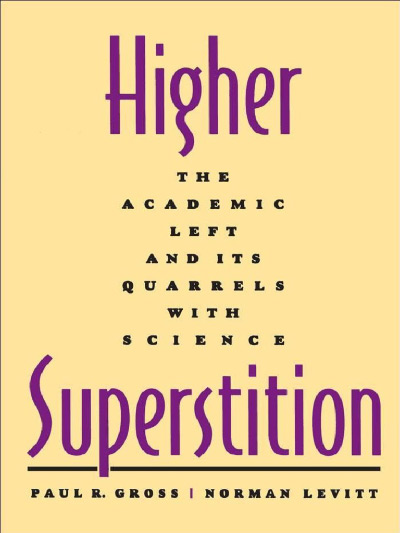 Higher Superstition: The Academic Left and Its Quarrels with Science, by Paul R. Gross and Norman Levitt. Johns Hopkins University Press, 1997.
Higher Superstition: The Academic Left and Its Quarrels with Science, by Paul R. Gross and Norman Levitt. Johns Hopkins University Press, 1997.
From Wikipedia: “Gross and Levitt [are] defenders of the philosophy of scientific realism, opposing postmodernist academics who question scientific objectivity. They asserted that anti-intellectual sentiment in liberal arts departments (especially English departments) caused the increase of deconstructionist thought, which eventually resulted in a deconstructionist critique of science. They saw the critique as a ‘repertoire of rationalizations’ for avoiding the study of science.
“Topics discussed include: cultural constructivism or social constructivism, the strong programme, the science criticism of Stanley Aronowitz and Bruno Latour, postmodernism and deconstructionism and their influence on American academia, the science criticism of Andrew Ross, feminist science criticism, environmentalist science criticism and ‘apocalyptic naturism,’ Jeremy Rifkin’s influential ‘pseudoscientific alarmism,’ attacks on medical research connected with AIDS activism and animal rights advocacy, and Afrocentrism. The authors find it unfortunate that social scientists and literary critics often consider themselves qualified to criticize the natural sciences without learning much about them in detail, and worry about what would replace Enlightenment ideals of universalism and rationalism, and objective truths about the natural world as ascertained by a scientific methodology of repeatable experiments, if these were to be discredited, as many science critics in the humanities wish to do.”
“How I was Kicked Out of the Society for Classical Studies Annual Meeting,” by Mary Frances Williams. Quillette, Feb. 26, 2019.
Williams was expelled from a classics scholarly meeting in 2019 because she opposed racial quotas in scholarly journals and defended classics as a field of scholarly work. She explains that she argued that “the abandonment of philology, the heart of our discipline, means that there can be no true research in the field. We can have no new editions of texts, no new translations, no work on ancient history, no scholarly work on ancient authors, without knowledge of the languages.”
Williams writes, “It is important to stand up for Classics as a discipline, and promote it as the political, literary, historical, philosophical, rhetorical, and artistic foundation of Western Civilization, and the basis of European history, tradition, culture, and religion. It gave us the concepts of liberty, equality, and democracy, which we should teach and promote. We should not apologize for our field. It is important to go back to teaching undergraduates about the great classical authors—Cicero, the Athenian dramatists, Homer, Demosthenes, the Greek and Roman historians, Plato, and Aristotle—in English translation in introductory courses. ...”
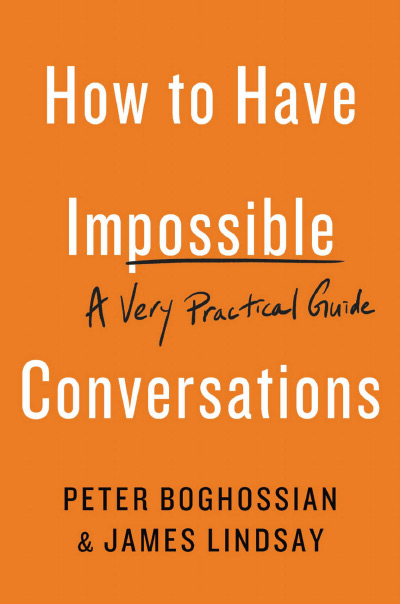 How to Have Impossible Conversations: A Very Practical Guide, by Peter Boghossian and James Lindsay. Da Capo, 2019.
How to Have Impossible Conversations: A Very Practical Guide, by Peter Boghossian and James Lindsay. Da Capo, 2019.
Niall Ferguson writes, “I thought I knew all I needed to know about conversations and arguments. I was wrong. I just knew a lot about debates and rows. In their insightful and highly readable new book, Peter Boghossian and James Lindsay offer all kinds of ingenious pathways to constructive dialogue. At a time when public discourse has degenerated into mud-slinging and when campuses favour every kind of diversity except viewpoint diversity, this is an invaluable contribution. I guarantee that reading it will make you more—much more—persuasive.”
“Humanities: Doomed to Lose?,” by Mark Bauerlein. New Criterion, November 2014.
How humanities professors are letting identity politics destroy their discipline.
“I Must Object: A Rebuttal to Brown University’s Letter on Racism in the United States,” by Glenn C. Loury. City Journal, June 5, 2020.
Social scientist Loury writes, “I deeply resented the letter. First of all, what makes an administrator (even a highly paid one, with an exalted title) a ‘leader’ of this university? We, the faculty, are the only ‘leaders’ worthy of mention when it comes to the realm of ideas. Who cares what some paper-pushing apparatchik thinks? It’s all a bit creepy and unsettling. Why must this university’s senior administration declare, on behalf of the institution as a whole and with one voice, that they unanimously—without any subtle differences of emphasis or nuance—interpret contentious current events through a single lens?”
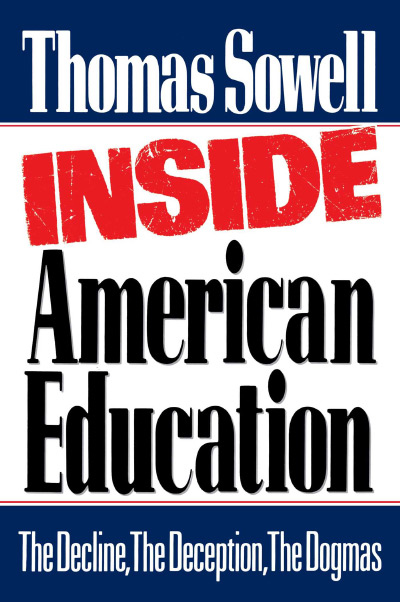 Inside American Education: The Decline, The Deception, The Dogmas, by Thomas Sowell. Free Press, 2003.
Inside American Education: The Decline, The Deception, The Dogmas, by Thomas Sowell. Free Press, 2003.
Sowell points out that administrators in institutions of higher education in practice countenance violence and disruption on behalf of politically correct goals, but are quite punitive toward small infractions where the perpetrator is opposed to such politically correct goals.
Sowell contends that professors in highly ideological courses lure students with lax grading. He also contends that professors in, say, the humanities, lard courses with indoctrination in matters outside their field of specialization, say, economics. Sowell also includes criticism of K–12 education in this volume.
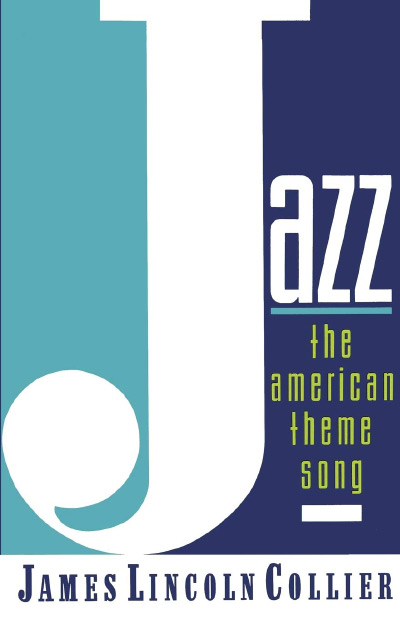 Jazz: The American Theme Song, by James Lincoln Collier. Oxford University Press, 1995.
Jazz: The American Theme Song, by James Lincoln Collier. Oxford University Press, 1995.
Kirkus Reviews: “Ten philosophical essays on issues in jazz scholarship from jazz-historian ... Collier (author of controversial biographies of Armstrong, Ellington, and Goodman, among other works). Collier discusses the rise of jazz in America; the importance of the soloist; jazz rhythm; jazz as art versus jazz as popular music; the contributions of blacks, whites, and Creoles to the birth of jazz; jazz scholarship; and local jazz. He does much to debunk common myths about jazz: that it was created solely by black musicians; that improvisation was always central to performance; and that ‘swing,’ or the performer’s unique sense of rhythm, is something that can be felt but not analyzed. Collier is unafraid to take on the establishment, attacking many jazz writers as presenting ‘the same dreary mish-mash of half-truths, guesswork, and ancient myths, many of them long since refuted.’ ... [W]hile he urges critics to live up to higher standards of academic scholarship, he attacks the academy for ‘homogenizing’ the music as well as for driving away its original popular audience.”
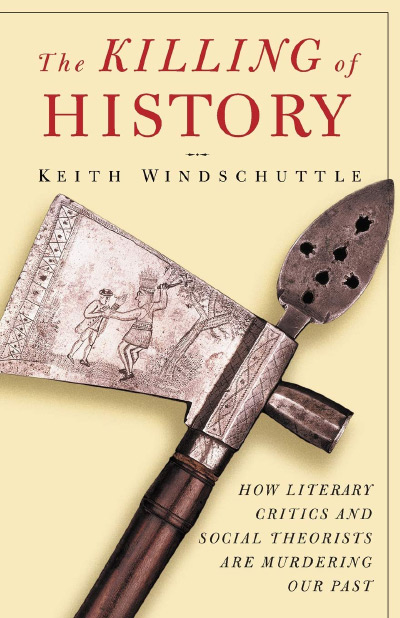 The Killing of History: How Literary Critics and Social Theorists Are Murdering Our Past, by Keith Windschuttle. Encounter Books, 2000.
The Killing of History: How Literary Critics and Social Theorists Are Murdering Our Past, by Keith Windschuttle. Encounter Books, 2000.
From the review in Publishers Weekly: “The deliberately provocative title of this latest entry in the ongoing culture wars belies a reasonable, subtly argued if wide-ranging and at times unwieldy critique of contemporary historical theory. ... Windschuttle contends that the introduction of fashionable academic ‘history’ courses under such rubrics as cultural, media and gender studies are agenda-driven and have undercut the practices of history as a discipline. Windschuttle ... places much blame for the decline in traditional history on postmodernist French literary and social theorists—above all, Michel Foucault. In the introduction of theoretical approaches like structuralism, poststructuralism, deconstruction and semiotics, he says, contemporary radical theorists posit a cultural relativism that denies an objective, knowable truth about the past. ...
“Each of the nine chapters examines a particular episode or issue and analyzes current trends in scholarship. For example, a chapter on the conquest of Mexico presents a fascinating overview of this event and various historians’ interpretations of it. The author warns that ‘cultural relativism will never serve the real interests of indigenous peoples if it denies them access to the truth about the past.’”
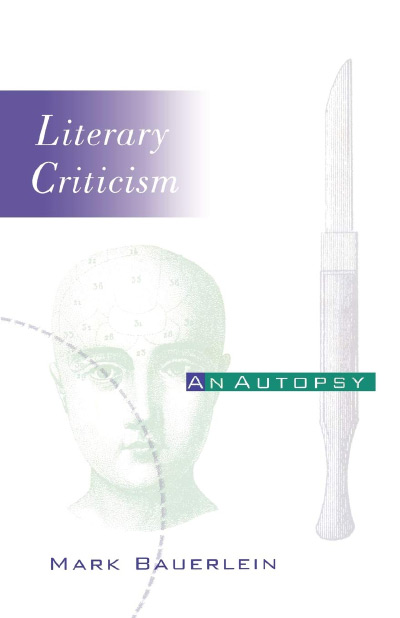 Literary Criticism: An Autopsy, by Mark Bauerlein. University of Pennsylvania Press, 1997.
Literary Criticism: An Autopsy, by Mark Bauerlein. University of Pennsylvania Press, 1997.
Richard B. Schwartz writes, “Professor Bauerlein looks at the language used by [recent literary critics]. Essentially, he takes approximately two dozen terms currently (1997) used commonly in literary studies, explains them and attempts to ascertain what they are really about, terms such as ‘rethink’, ‘problematize’ and ‘radical.’ The conclusion is that the words are essentially shortcuts. They enable young and undereducated scholars to advance themselves professionally by using intellectual shorthand to sound learned and worthy of admission to the exalted reaches of the professoriate. Basically, the methods to which the terms relate and the procedures in which they flourish are methods which are short on logic and historical evidence. Those methods simultaneously depreciate the importance of logic and historical evidence to validate the procedures which they have put in their place.
“In an epilogue the author surveys literary studies from the late 1950’s to the late 1990’s. In the 1950’s literary study involved broad coverage and deep specialization, the latter informed by the knowledge of a vast array of material. Twenty years later it consisted of the appropriation and application of the thought of one of the French Nietzscheans; now (i.e., twenty years later—1997) it consists of the study of power relationships, principally based on race, class and gender. The devolution process has essentially made literary study far easier, far more political, and far more predictable. At the same time, its vocabulary has been utilized to make it appear to be more learned, more difficult and more revolutionary.
“Though this brief description may make the book sound like a screed, it is not. The examination of the terms is very learned, and it is done through the use of carefully-applied logic and a vast array of examples.”
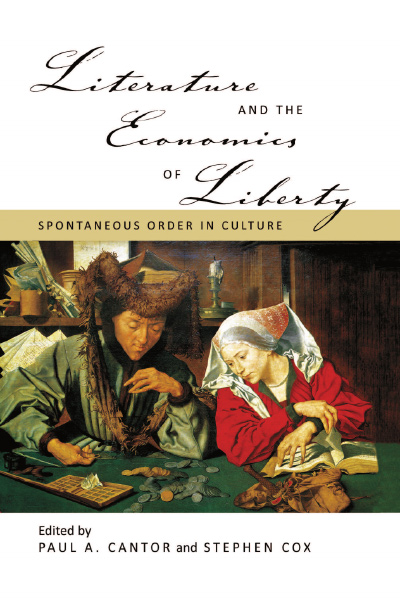 Literature and the Economics of Liberty: Spontaneous Order in Culture, ed. Paul A. Cantor and Stephen Cox. Ludwig von Mises Institute, 2010.
Literature and the Economics of Liberty: Spontaneous Order in Culture, ed. Paul A. Cantor and Stephen Cox. Ludwig von Mises Institute, 2010.
Bruce Edward Walker writes, “Paul A. Cantor and Stephen Cox in their collection of brilliant essays in the Economics of Literature & Liberty ... take free-market economics as the basis for examining, for the most part, well-known literary works by the likes of Cervantes, Willa Cather, Joseph Conrad, Charles Dickens, H. G. Wells, Thomas Mann and others. One need not be conversant in any of the works under consideration to appreciate the depth of literary and economic knowledge displayed by these authors. Nor do readers require more than a perfunctory background in economics. All heavy lifting is provided by the critics involved in the project.
“H. L. Mencken wrote that the sine qua non of all good criticism should be its ability to stand alone as a piece of art regardless the qualities inherent in the object of the criticism. Cantor, Cox and the other critics whose essays appear in Economics of Literature & Liberty attain this goal effortlessly by providing insightful analyses and informed explication du texte, providing ripping good yarns in addition to artful criticism and sound economics.”
Cantor writes, “What we have learned from economics and biology is that in spontaneous orders, which develop or evolve over time, some imperfections are compatible with an overall coherence. This insight can in turn show us a way out of the aporia into which the conflict between the New Criticism and Deconstruction threatened to lead us.”
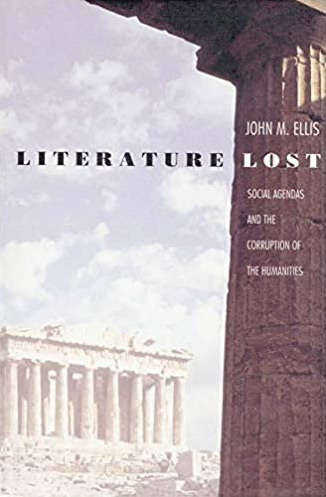 Literature Lost: Social Agendas and the Corruption of the Humanities, by John M. Ellis. Yale University Press, 1999.
Literature Lost: Social Agendas and the Corruption of the Humanities, by John M. Ellis. Yale University Press, 1999.
Yale University Press: “Ellis begins by showing that political correctness is a recurring impulse of Western society and one that has a discouraging history. He reveals the contradictions and misconceptions that surround the new orthodoxy and demonstrates how it is most deficient just where it imagines itself to be superior. Ellis contends that humanistic education today, far from being historically aware, relies on anachronistic thinking; far from being skeptical of Western values, represents a ruthless and unskeptical Western extremism; far from being valuable in bringing political perspectives to bear, presents politics that are crude and unreal; far from being sophisticated in matters of ‘theory,’ is largely ignorant of the range and history of critical theory; far from valuing diversity, is unable to respond to the great sweep of literature.”
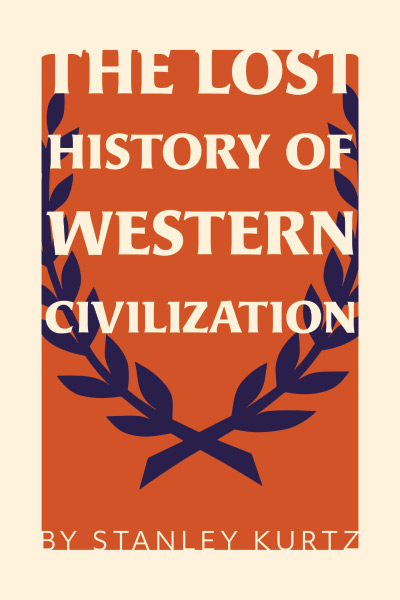 The Lost History of Western Civilization, by Stanley Kurtz. National Association of Scholars, 2020. Download PDF
The Lost History of Western Civilization, by Stanley Kurtz. National Association of Scholars, 2020. Download PDF
Mark Bauerlein writes, "The Lost History of Western Civilization is a badly-needed correction to our historical understanding of the West. Stanley Kurtz meticulously shows how a politically- motivated thesis about Western Civilization has been a rationale for emptying the curriculum of our greatest cultural inheritance. In casting Western Civilization as a fabrication of imperialists and warmongers of the early-20th century, the thesis discredited the whole enterprise of handing down to students the legacy of Plato, Sophocles, Virgil, Dante, Milton, et al. It was a false depiction, as Kurtz shows, but it has altered education since the 1980s—and for the worse. This report points the way toward restoring a proper appreciation of the Western tradition, and rightful pride in it.”
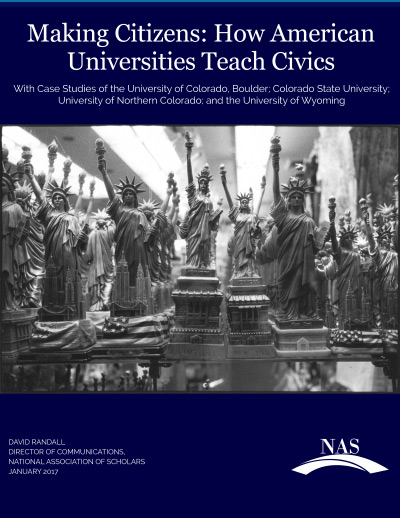 Making Citizens: How American Universities Teach Civics, by David Randall with contributions by Ashley Thorne. National Association of Scholars, 2017. Download PDF
Making Citizens: How American Universities Teach Civics, by David Randall with contributions by Ashley Thorne. National Association of Scholars, 2017. Download PDF
National Association of Scholars: “The ‘New Civics’ redefines civics as progressive political activism. Rooted in the radical program of the 1960s’ New Left, the New Civics presents itself as an up-to-date version of volunteerism and good works. Though camouflaged with soft rhetoric, the New Civics, properly understood, is an effort to repurpose higher education.
Stanley Kurtz writes, “Making Citizens, was the first sustained attempt to raise the alarm on action civics, and remains the most thorough critique of this practice.”
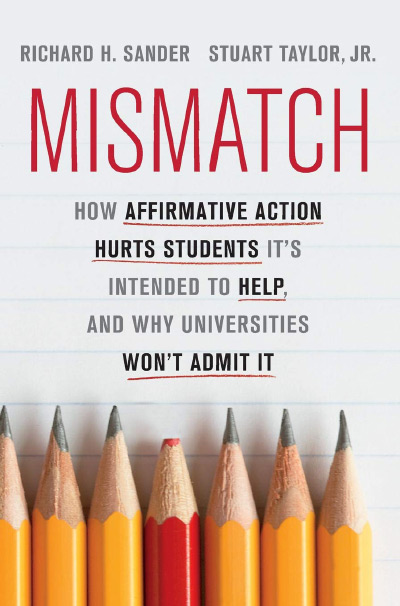 Mismatch: How Affirmative Action Hurts Students It’s Intended to Help, and Why Universities Won’t Admit It, by Richard Sander and Stuart Taylor Jr. Basic Books, 2012.
Mismatch: How Affirmative Action Hurts Students It’s Intended to Help, and Why Universities Won’t Admit It, by Richard Sander and Stuart Taylor Jr. Basic Books, 2012.
Basic Books: “Richard Sander and Stuart Taylor present compelling evidence of the failure of our current affirmative action policies through stunning, previously unpublicized admissions and academic performance data from colleges and universities around the country and interviews with black and Hispanic administrators and former students.”
At the heart of Sander and Taylor’s book is the theory of “mismatch.” They argue that the use of racial preferences in higher education puts students in academic situations where the odds are stacked against them from the beginning.”
Judge Richard A. Posner writes, “This lucid, data-rich book is simply the best researched and most convincing analysis ever done on affirmative action in higher education, a work at once impeccably scholarly and entirely accessible to anyone interested in the social and legal ramifications of well-intentioned policies that, as the authors show, have a boomerang effect on the intended beneficiaries.”
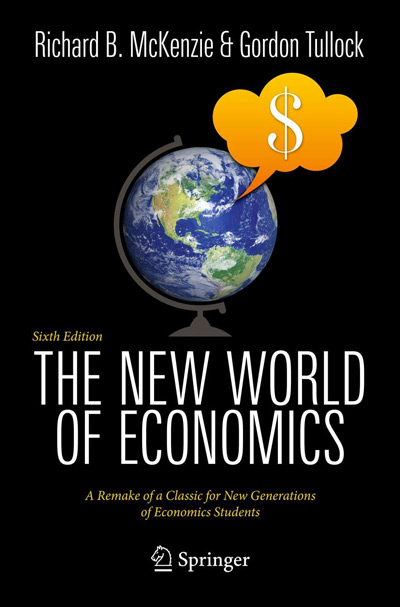 The New World of Economics, by Richard B. McKenzie and Gordon Tullock. 6th ed., Springer, 2012, chap. 5: 69-90.
The New World of Economics, by Richard B. McKenzie and Gordon Tullock. 6th ed., Springer, 2012, chap. 5: 69-90.
Richard B. McKenzie and Gordon Tullock discuss many topics—among them the hidden economics of the university including issues such as sports, housing, and professorial tenure.
“No, the Woke Won’t Debate You; Here’s Why,” by James Lindsay. New Discourses, July 30, 2020.
Social Justice scholars don’t want to play by the existing rules (like “conversation and debate as a means to better understand society and advance truth”), Lindsay points out. “They don’t want to play our game at all; they want to disrupt and dismantle it.”
“Debate and conversation, especially when they rely upon reason, rationality, science, evidence, epistemic adequacy, and other Enlightenment-based tools of persuasion” are the very things they don’t like about the existing system. “Those are not their methods and they reject them,” Lindsay says, “Their methods are, instead, storytelling and counter-storytelling, appealing to emotions and subjectively interpreted lived experience, and problematizing arguments morally, on their moral terms.”
“Our Higher Education System Fails Leftist Students,” by Michael C. Munger. James G. Martin Center for Academic Renewal, August 26, 2014. Reprinted in his The Thing Itself: Essays on Academics and the State. Mungerella Publishing, 2015, pp. 137-154.
Munger writes, “The young people that our educational system is failing are the students on the left. They aren’t being challenged, and don’t learn to think. Students on the left should sue for breach of contract. We promise to educate them, and then merely pat them on the head for having memorized the ‘correct’ answer!”
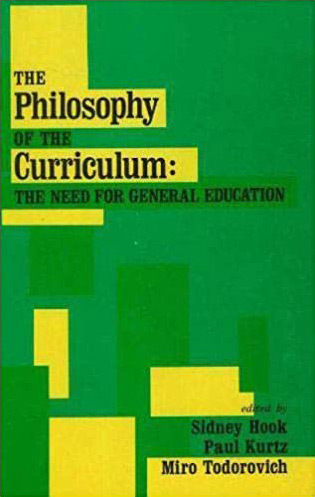 “The Philosophy of the Curriculum,” by Sidney Hook. In Sidney Hook, Paul Kurtz, and Miro Todorovich, eds., The Philosophy of the Curriculum. Prometheus Books, 1975.
“The Philosophy of the Curriculum,” by Sidney Hook. In Sidney Hook, Paul Kurtz, and Miro Todorovich, eds., The Philosophy of the Curriculum. Prometheus Books, 1975.
David Sidorsky writes, “Hook sought to formulate the indispensable subject matter for a curriculum in higher education. While Hook maintained his previous thesis that the development of critical thinking was crucial to any valuable educational experience, his formulation of the curricular subject matter reveals the degree to which the critical method is intertwined with the learning of appropriate subject matter, whether in the humanities or the sciences. Further, Hook defended liberal education as requiring the reading and study of the Western canon even if such a requirement goes against perceived student needs and the expression of student preferences, or violates some proposed criterion of social relevance. ... Hook recognized the legitimate role of a liberal education as the initiation of every human being into the cultural traditions of his society. Such initiation into a tradition was compatible with the development of a critical method and approach.
“The idea that the classroom was a community of free inquiry remained a central feature of Hook’s philosophy of education. ... Thus, the growing curricular practice of ‘cultural studies’ of ‘designated groups of victims’ represented the transformation of the classroom into a community of shared substantive values with a political agenda rather than a community of inquiry with a shared critical method. To the degree to which multiculturalism ... represented a species of political commitment to designated deprived cultural groups, it would entail, for Hook, an unjustified metamorphosis of the university from a community of free inquiry into a community of political faith and advocacy.”
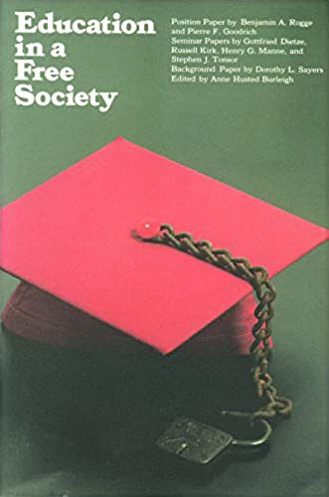 “The Political Economy of Modern Universities,” by Henry G. Manne. in Education in a Free Society, ed. by Anne Husted Burleigh. Liberty Fund, 1973: 165-205.
“The Political Economy of Modern Universities,” by Henry G. Manne. in Education in a Free Society, ed. by Anne Husted Burleigh. Liberty Fund, 1973: 165-205.
Manne writes, “[T]here is really no way students can make their demands felt [within the nonprofit milieu of university organization]. Those who make decisions in universities cannot profit personally by operating the university in the educational interests of students. The result, therefore, is from the students' point of view an appalling disrespect of their wishes. ...
“Basically, there are three organizational schemes for the operation of universities. These are the free-market organization, dictatorship, and a cooperative system. The university world is presently in the process of passing from the second to the third of these without the first ever having been seriously tried. Consumer preference could operate in this field as well as in any other, and meaningful competition with no significant external costs could prevail.”
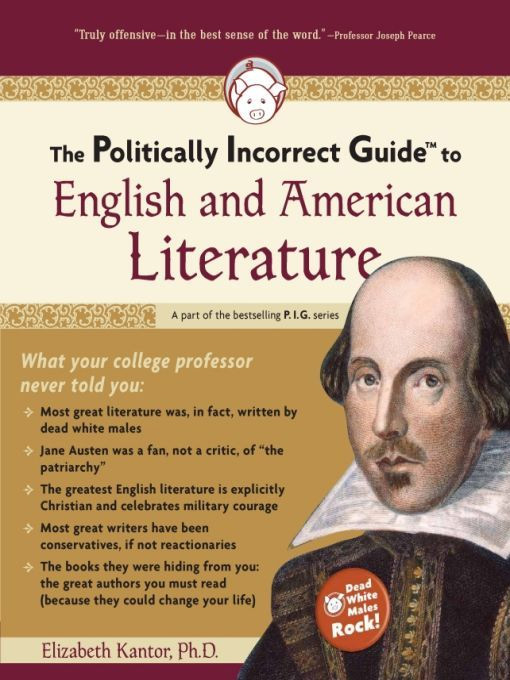 The Politically Incorrect Guide to English and American Literature, by Elizabeth Kantor. Regnery Publishing, 2006.
The Politically Incorrect Guide to English and American Literature, by Elizabeth Kantor. Regnery Publishing, 2006.
From an interview with Kantor: “[T]he Jane Austen section is the part of the book that will really annoy the feminists. Because, contrary to what you may have heard, Jane Austen’s novels are not ‘subversive.’ They’re funny. Jane Austen made fun of men (and of women, too). But it was human folly and vice, not ‘patriarchal oppression,’ that made her mad. ... She was quite comfortable with traditional sex roles. The villains in her novels are not jealous, controlling patriarchs. They’re weaklings. The men who cause the real trouble in Austen novels are distant, uninvolved fathers; uxorious husbands who do selfish things to please their awful wives; and lovers who pay too much attention to girls they aren’t ready to marry. ...
“Affirmative action in the curriculum is as counterproductive as affirmative action in admissions. I mean, what good does it do women and minorities to enroll in college in greater numbers than in past, if the curriculum they get once they’re there is drastically dumbed down from the curriculum that white men used to get, back when mostly white men went to college? ...
“English professors seem to prefer teaching almost anything but their own subject. Including even the jetsam of other disciplines—discredited cast-offs including Marxism, Freudian analysis, and I, Rigoberta Menchu. Not to mention the English professors teaching foreign films, detective novels, comic books, and pornography. Second, in that English departments are ground zero for the postmodernist attack on—well, on almost anything of value you might name, from truth and beauty to Western civilization to the idea that words mean things. Virtually every college student takes one or more English classes. That made good sense when those classes taught universally valuable lessons such as how to read Shakespeare and how to write a coherent sentence. But now those English classes mean that virtually every college student gets introduced to some variety of anti-Western, anti-rational ideology.”
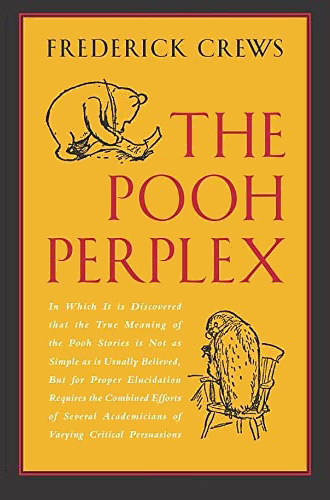 The Pooh Perplex: A Freshman Casebook, by Frederick C. Crews. University of Chicago Press, 2003.
The Pooh Perplex: A Freshman Casebook, by Frederick C. Crews. University of Chicago Press, 2003.
A satire on the sort of casebook assigned to college undergrads in English literature classes. The book offers essays on the Winnie-the-Pooh series—parodying critics and English professors who take Marxian, Freudian, and New Criticism approaches or follow Irving Babbitt, R. S. Crane, F.R. Leavis or Leslie Fiedler.
University of Chicago Press: “This edition contains a new preface by the author that compares literary theory [in 1963 to such theory in 2003] and identifies some of the real-life critics who were spoofed in certain chapters.” Personally, I find that one can often get valuable insights from the New Criticism, Irving Babbitt-style New Humanism, and F.R. Leavis approaches and from a cousin of the R.S. Crane approach—namely that of Yvor Winters.
Orville Prescott writes, “In twelve glittering, brightly malicious essays, [Crews] has pole-axed and then neatly eviscerated twelve varieties of currently fashionable literary criticism. ... Anyone who values his franchise as a literary highbrow ... will have to be able to quote the Pooh Perplex.”
Postmodern Pooh, by Frederick C. Crews. Northwestern University Press, 2006.
The book pretends to be the proceedings of a panel on Winnie-the-Pooh at an annual convention of the Modern Language Association. Crews continues the satire he gave us in The Pooh Perplex—now adding parodies on deconstruction, feminism, queer theory, and recovered memory theory. Mark Pendergrast writes, “All you lit-crit junkies, rush right out and snag a copy of Postmodern Pooh. Once again, Crews made me laugh until I wept.”
 “Private Property and the Relative Cost of Tenure,” by Armen A. Alchian, in his Economic Forces at Work: Selected Works. Liberty Fund, 1977: 177-202.
“Private Property and the Relative Cost of Tenure,” by Armen A. Alchian, in his Economic Forces at Work: Selected Works. Liberty Fund, 1977: 177-202.
Alchian goes into the unique labor market for professors in the non-profit rent-seeking enterprise of academia to explain the propensity for giving tenureship and why tenure is inefficient.
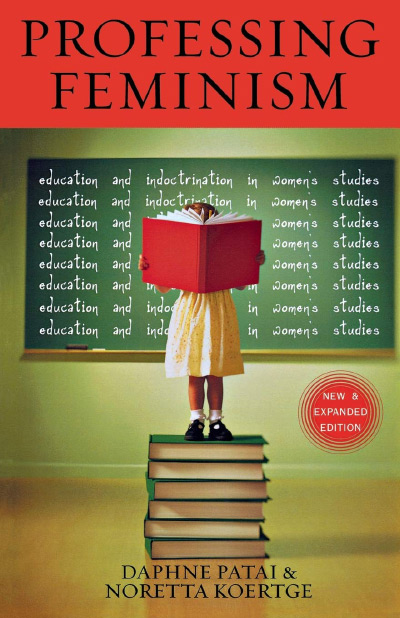 Professing Feminism: Education and Indoctrination in Women’s Studies, by Daphne Patai and Noretta Koertge. Rev. ed., Lexington Books, 2003.
Professing Feminism: Education and Indoctrination in Women’s Studies, by Daphne Patai and Noretta Koertge. Rev. ed., Lexington Books, 2003.
Lexington Books: “Feminists have often called Women’s Studies the ‘academic arm of the women’s movement.’ But Daphne Patai and Noretta Koertge charge that the attempt to make Women’s Studies serve a political agenda has led to deeply problematic results: dubious scholarship, pedagogical practices that resemble indoctrination more than education, and the alienation of countless potential supporters. In this new and expanded edition of their controversial 1994 book, the authors update their analysis of what’s gone wrong with Women’s Studies programs. [The] original chapters feature interviews with professors, students, and staffers who invested much time and effort in Women’s Studies, and new chapters look primarily at documents recently generated from within Women’s Studies itself. Through critiques of actual program mission statements, course descriptions, newsletters, and e-mail lists devoted to feminist pedagogy and Women’s Studies, and, not least, the writings of well-known feminist scholars, Patai and Koertge provide a detailed and devastating examination of the routine practices found in feminist teaching and research.”
“The Question of Orientalism,” by Bernard Lewis. New York Review of Books, June 24, 1982. “Orientalism: An Exchange,” Edward W. Said and Oleg Grabar, with a reply by Bernard Lewis. New York Review of Books, August 12, 1982.
From Lewis’s reply to Said: “In my article I did not make Mr. Said’s political views or associations a central issue, for the simple reason that his assertions about Orientalism, like my criticism of them, must stand or fall on their scholarly merits. His views and my views may no doubt influence the opinions we form, though obviously this takes place in different ways, but in themselves they prove us neither right nor wrong. I probably disagree with [the Marxist scholar] Professor [Maxime] Rodinson ... even more than I disagree on political matters with Said. The difference is that I respect Rodinson’s scholarship.
Mr. Said seems to be unable to conceive that there may be intellectual disagreements which are not political in origin or purpose and that these disagreements may be discussed in anything but emotional and violent language. Some of us try to maintain a standard of honesty in research and accuracy in exposition, and, even under extreme provocation, to discuss our differences in the language of civilized debate. Incidentally Rodinson, in a recent publication, draws a clear distinction between political opinion and scholarly achievement, and applies the term “ideological cretinism” to those who use the one to judge the other.” ...
[I]f Arabic studies in Germany, and for that matter in Holland, began as early as in France and earlier than in Britain, and moreover reached at least an equal level of competence and originality, without any imperial ... connection [to the Arab world], [ Mr. Said’s] thesis falls to the ground. ... The tragedy of Mr. Said’s Orientalism is that it takes a genuine problem of real importance, and reduces it to the level of political polemic and personal abuse.
“‘Reform Calculus’ Has Been a Disaster, Critics Charge,” by Robin Wilson. Chronicle of Higher Education, February 7, 1997.
On Harvard Consortium Calculus and its relatives. From the article: “’This approach really shies away from anything but superficial use of skills,’ says Ralph L. Cohen, a professor of mathematics at Stanford University, which after seven years has decided to stop teaching the ‘reform calculus’ and to move back to something more traditional. ‘For students who really need to know math and use it, this wasn’t nearly sophisticated or rigorous enough.’”
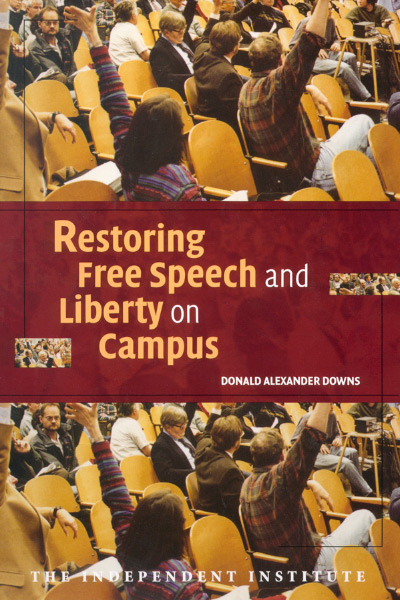 Restoring Free Speech and Liberty on Campus, by Donald A. Downs. Cambridge University Press for the Independent Institute, 2005.
Restoring Free Speech and Liberty on Campus, by Donald A. Downs. Cambridge University Press for the Independent Institute, 2005.
The Independent Institute’s synopsis reads, “Downs examines the key intellectual and political movements that influenced the rise of progressive censorship in the form of speech codes, broad anti-harassment codes, and similar rules. The [book] attempts to answer a puzzling question: just why did the advocates of progressive causes start viewing free speech and other basic constitutional principles as inimical to their causes?”
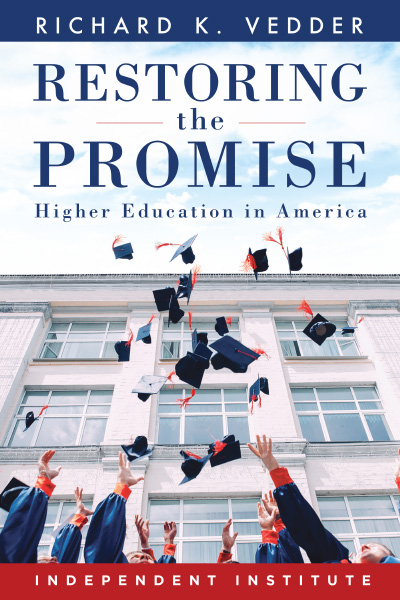 Restoring the Promise: Higher Education in America, by Richard K. Vedder. Independent Institute, 2019.
Restoring the Promise: Higher Education in America, by Richard K. Vedder. Independent Institute, 2019.
Williamson M. Evers’s blurb reads, “Throw out your volumes from the Carnegie Commission, relegate William Bowen and Derek Bok to lower shelves. With Restoring the Promise, Richard Vedder, a true expert on the subject, has given us in one book the facts and analysis we’ve long needed on all matters higher educational. Is too much indoctrination by college professors going on? Is the slogan ‘college for all’ encouraging student-loan delinquency? Are colleges using monopoly power to charge too much tuition? Are administrators building bureaucratic empires? Are there all too many university employees who do not contribute to student learning? The answers are in this truly excellent book.”
“Schools Must Resist Destructive Anti-Racist Demands,” by John McWhorter. The Atlantic, January 29, 2021.
Columbia University professor McWhorter writes: “To give in to anti-intellectual, under-considered, disproportionate, or hostile demands [in manifestos] is condescending to the signatories and the protesters. It implies that they can do no better, and that authorities must suspend their sense of logic, civility, and progress as some kind of penance for slavery, Jim Crow, redlining, and the deaths of people such as [George] Floyd. That ‘penance’ would hurt only the community in the end, through lower educational quality. ...”
“The writers of manifestos might classify resistance as racist, denialist backlash. But the civil, firm dismissal of irrational demands is, rather, a kind of civic valor. School officials must attend to the fine line between enlightenment and cowardice—for the benefit of not only themselves, but the Black people they see themselves as protecting.”
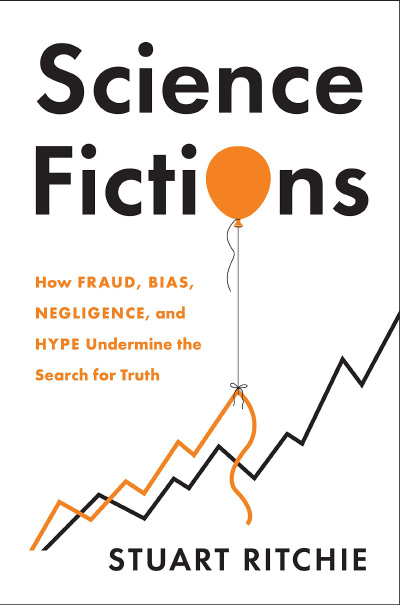 Science Fictions: How Fraud, Bias, Negligence, and Hype Undermine the Search for Truth, by Stuart Ritchie. Metropolitan Books, 2020.
Science Fictions: How Fraud, Bias, Negligence, and Hype Undermine the Search for Truth, by Stuart Ritchie. Metropolitan Books, 2020.
Metropolitan Books: “[F]ailures in peer review and mistakes in statistics have rendered a shocking number of scientific studies useless—or, worse, badly misleading. Such errors have distorted our knowledge in fields as wide-ranging as medicine, physics, nutrition, education, genetics, economics, and the search for extraterrestrial life. ... Stuart Ritchie’s own work challenging an infamous psychology experiment helped spark what is now widely known as the ‘replication crisis.’ ...”
Ritchie writes, “For a scientific finding to be worth taking seriously, it can’t be something that occurred because of random chance, or a glitch in the equipment, or because the scientist was cheating or dissembling. It has to have really happened. And if it did, then in principle I should be able to go out and find broadly the same results as yours. In many ways that’s the essence of science, and something that sets it apart from other ways of knowing about the world: if it won’t replicate, then it’s hard to describe what you’ve done as scientific at all.”
“The Seriousness of Yvor Winters”, by David Yezzi. The New Criterion, June 1997.
Yezzi examines the literary criticism by poet-critic Yvor Winters. Winters defended paraphrasable content and the plain style in poetry against the excesses of Romanticism. Yezzi writes, “Romantic poetry often employed associative logic, fuzzy revery, and words emotionally in excess of their subjects. The ‘moral’ Wintersian poet controls emotion, releasing it through restraint. He aims to match the argument of the poem to the proper degree of emotion.”
Yezzi quotes Winters from his book Primitivism and Decadence, on his opposition to Romanticism and relativism: “The Romantic theory of human nature teaches that if man will rely upon his impulses, he will achieve the good life. When this notion is combined, as it frequently is, with a pantheistic philosophy or religion, it commonly teaches that through surrender to impulse man will not only achieve the good life but will achieve a kind of mystical union with the Divinity: this for example is the doctrine of Emerson. Literature thus becomes a form of self-expression. ... The theory of literature I defend ... is absolutist. I believe that the work of literature, in so far as it is valuable, approximates a real apprehension and communication of a particular kind of objective truth.”
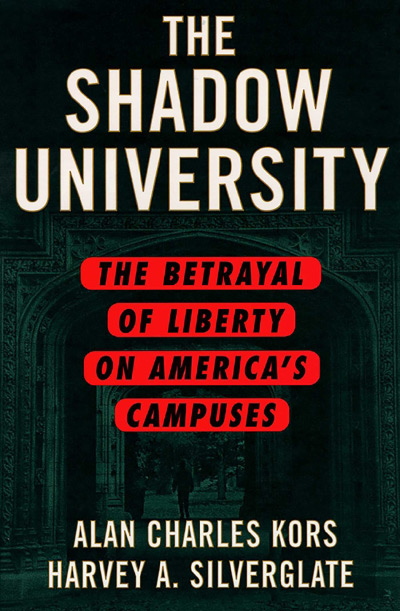 The Shadow University: The Betrayal of Liberty on America’s Campuses, by Alan Charles Kors and Harvey A. Silverglate. Harper Perennial, 1999.
The Shadow University: The Betrayal of Liberty on America’s Campuses, by Alan Charles Kors and Harvey A. Silverglate. Harper Perennial, 1999.
Daniel Shapiro writes, “Many books have discussed political indoctrination on American campuses, but none is as thorough and damning as this one. Alan Kors, a history professor at the University of Pennsylvania, and Harvey Silverglate, a criminal defense attorney and civil liberties litigator, present overwhelming evidence that the loss of liberty on campuses is far greater than most people realize. Speech codes, which punish students and faculty for offensive or ‘harassing’ speech, are ubiquitous. Due process is the exception rather than the rule: secret judicial proceedings routinely deny accused faculty and students the right to be represented by legal counsel, to confront or call witnesses, and to have an impartial judge and appeals process. Most chilling of all, ‘sensitivity training,’ a.k.a. thought reform, tells students what to believe and labels them as ‘in denial’ or as ‘oppressors’ unless they profess the politically correct orthodoxy about race, gender, and so on.”
Christina Hoff Sommers writes, “A massive, irresistible manifesto for student rights. Kors and Silverglate show how the cultural left’s assault on individual liberties is effectively transforming the academy into ‘an island of oppression in a sea of freedom.’ Convincingly argued, authoritatively documented in moving human detail, it is a momentous achievement.”
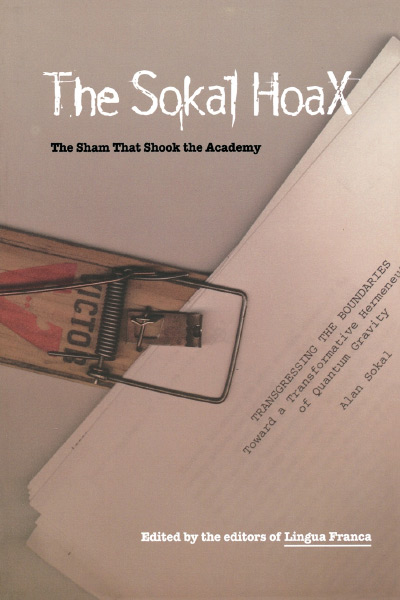 The Sokal Hoax: The Sham That Shook the Academy, ed. by the editors of Lingua Franca. University of Nebraska Press, 2000.
The Sokal Hoax: The Sham That Shook the Academy, ed. by the editors of Lingua Franca. University of Nebraska Press, 2000.
From Wikipedia: “Alan Sokal, a physics professor at New York University and University College London ... submitted an article [in 1996] to Social Text, an academic journal of postmodern cultural studies. The submission was an experiment to test the journal’s intellectual rigor, and specifically to investigate whether ‘a leading North American journal of cultural studies—whose editorial collective includes such luminaries as Fredric Jameson and Andrew Ross—[would] publish an article liberally salted with nonsense if (a) it sounded good and (b) it flattered the editors’ ideological preconceptions.’
“The article, ‘Transgressing the Boundaries: Towards a Transformative Hermeneutics of Quantum Gravity,’ was published in the journal’s spring/summer 1996 ... issue. It proposed that quantum gravity is a social and linguistic construct. ... Sokal wrote [tongue in cheek] that the concept of ‘an external world whose properties are independent of any individual human being’ was ‘dogma imposed by the long post-Enlightenment hegemony over the Western intellectual outlook.’ ...
“Moreover, the article’s footnotes conflate academic terms with sociopolitical rhetoric, e.g.: ‘Just as liberal feminists are frequently content with a minimal agenda of legal and social equality for women and "pro-choice," so liberal (and even some socialist) mathematicians are often content to work within the hegemonic Zermelo–Fraenkel framework (which, reflecting its nineteenth-century liberal origins, already incorporates the axiom of equality) supplemented only by the axiom of choice.’’’
A Student’s Guide to Music History, by R. J. Stove. ISI Books, 2007.
A concise history in 135 pages of classical music from the Middle Ages to the post World War II era. The review in Choice says, “[Stove] has amassed an enormous amount of material in this small volume. ... Stove’s style is entertaining, a decided plus for a book of history, and wherever possible he includes humorous episodes/trivia often omitted in the more scholarly works on music history. Interspersed throughout are brief biographical sketches of several of the more famous composers. The reader will find the brief glossary of music forms and the bibliography most helpful.”
The review by John Simon in The Hudson Review says, “What Stove does in the first eighty-odd pages is to cover music history from Hildegard of Bingen to, roughly, Mikhail Glinka in a light-hearted, will-o’-the-wispy way that I find irresistible. ... The book is of use, first, to music lovers, who know most of this stuff, but find its cheerful, idiosyncratic encapsulation bracing. It works, second, for students. ... Finally, and perhaps chiefly, it scores as a piece of delightfully sophisticated writing, a good summer, or even winter, read. ... You cannot deny his Student’s Guide the privilege of being the only music history that can be savored, muscatel in hand, in the green shade of a beach umbrella.”
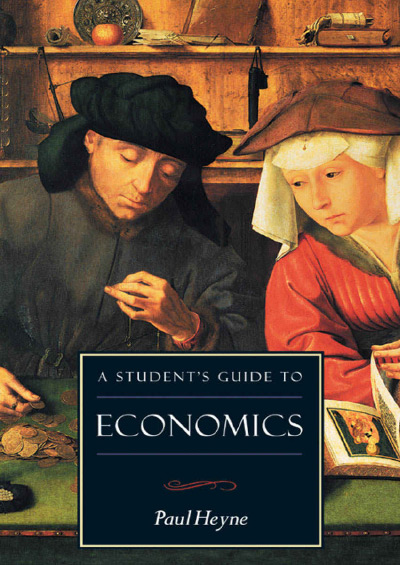 A Student’s Guide to Economics, by Paul Heyne. ISI Books, 2014.
A Student’s Guide to Economics, by Paul Heyne. ISI Books, 2014.
Nathan Albright writes, “[T]his book is a short [64 pages], almost pocket-sized introduction [to its subject]. ... After a short introductory note, the author discusses the beginnings of economic growth and price theory before discussing the reformulation of economic [theory], an introductory survey into the subject, the neglect of recessions and the rise of macroeconomics, the divergence between microeconomics and macroeconomics, and the change from the exchange process to the economizing process that took place for many theorists. After that there is a discussion of who is in charge of the economy (a serious question), the relation of ignorance and self-interest, exit and voice, questions of wealth, justice, and freedom, the relationship between organizations and markets, before some discussions about economic growth, the strange nature of economic theory, and some concluding comments as well as a bibliographic essay that encourages the reader to pick up some later books on economics like the writing of Peter Bauer, James Buchanan, Ronald Coase, Milton Friedman, Friedrich von Hayek, Ludwig von Mises, and others who had a great deal of influence on the author’s thinking. After this comes [an] ... afterword by [Thomas] DiLorenzo that plugs [Heyne’s] textbook [The Economic Way of Thinking] and its approach to economics, [which focuses] on the issue of exchange, something that has been too much neglected by many writers.”
Economist Donald J. Boudreaux writes, “The late Paul Heyne was one of this century’s finest economics educators. ... This short book ... is the best 100-pages-or-less introduction to economics and the economic way of thinking that I’ve ever read. Possessing a poet’s economy and skill with words, Heyne conveys not only the basic tenets of modern economics, but he goes a long way toward explaining their historical origins. The reader also sees on display in this monograph Paul Heyne’s truly deep insight into economics and its subject matter. Indeed, to explain economics as clearly, concisely, and beautifully as Heyne does requires a wisdom so profound that few economists ever come close to possessing it and the understanding that it makes possible. ... Even professional economists will gain by reading this book—despite its being accessible to almost any reader.”
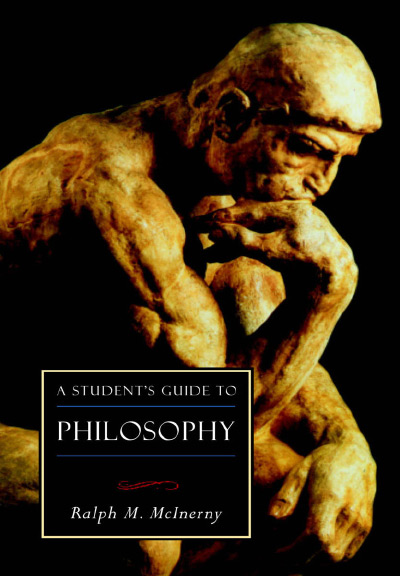 A Student’s Guide to Philosophy, by Ralph M. McInerny. ISI Books, 1999.
A Student’s Guide to Philosophy, by Ralph M. McInerny. ISI Books, 1999.
Nathan Albright writes, “At less than 100 pages, this book is definitely a short one. Yet it is certainly a thoughtful and worthwhile one for all that. The author begins with an introductory note that broadens the span of philosophy beyond that which most people realize, before discussing such matters as the pursuit of wisdom. He discusses how we come to insight and understanding as well as the role of common sense, as uncommon as it may be, in that endeavor. He discusses the debate between Plato and Aristotle and their various acolytes through the ages, and discusses the confused certainties of philosophy and the way that sophistry has traditionally been confronted. After this comes a look at philosophy in the age of science, the troubling results of the fact/value split in so much of modern philosophy, and the relationship of philosophy and religion. After a short discussion of why the author is a Thomist, there is a lengthy bibliographical essay that provides the reader with many books to read on philosophy as it relates to the ancient and contemporary world, all of which should make the wise and thoughtful reader of this book very knowledgeable about philosophy.”
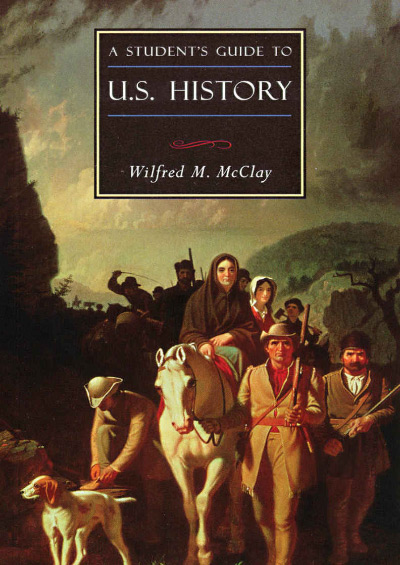 A Student’s Guide to U.S. History, by Wilfred M. McClay. ISI Books, 2000.
A Student’s Guide to U.S. History, by Wilfred M. McClay. ISI Books, 2000.
Nathan Albright writes, “[T]his little book [is] a compelling one ... that triumphs because it opens a window to a field that is too often neglected or underappreciated. All too often people study American history only because they have to, but this book encourages its readers to study American History because they want to, and that makes a big difference. When we want to study something, we will seek out sources far more interesting and worthwhile than the textbooks that are foisted upon us.”
“The book is a short one at about 100 pages but it manages to effectively ground American history on a solid foundation and then open a window [for the reader] into some genuinely interested aspects of American history that are well worth reading more about. ... The author begins with a discussion of what this book is and isn’t, properly framing expectations for the reader. After that he discusses history as laboratory and as memory, pointing to the limitations of history as a science but the importance of history as a repository of memory and as a genre of literature. The author then spends some time rethinking American history as well as addressing the multitude of myths that exist about American history largely because the mythic nature of American history (whether for good or ill) is nearly universal even if the meaning and content of that mythic nature is difficult to agree about. After a discussion of the relationship between micro and macro historical concerns, the author opens up some brief but fascinating windows on the relationships of America to Europe, capitalism, the city, equality, the founding, the frontier, immigration, liberty, nationalism and federalism, nature, pluralism, redemption, religion, revolution, self-making, and the South. This fascinating and provocative look at different matters ends with some caveats and a lengthy and worthwhile glimpse at a canon of American history and literature worth reading and appreciating.
“Subjective, Si! Objective, No!,” by Robert A. Nisbet. New York Times Book Review, April 5, 1970, 1-2, 36-37. Reprinted in Values, Objectivity, and the Social Sciences, ed. by Gresham Riley. Addison Wesley, 1974.
Renowned sociologist Nisbet criticizes the turn away from objectivity in the social sciences.
Tenured Radicals: How Politics Has Corrupted Our Higher Education, by Roger Kimball. Rev. ed., Ivan R. Dee, 1998.
Kimball writes, “Despite their differences, the one thing your literary deconstructionist, your Lacanian feminist, your post-structuralist Marxist, your New Historicist, and your devotee of what goes under the name of Cultural Studies can agree on is that the Western humanist tradition is a repository of ideas that are naïve, repressive, or both.
“The multicultural imperative proceeds on the assumption that all of cultural life is to be explained in political terms, preeminently in terms of gender, race, class, and ethnic origin. ... [M]ulticulturalists employ the tools of ethnic and sexual redress in order to transform the study of literature into a species of political propaganda and virtue-mongering.”
“Theory and the Humanities, Once More,” by Mark Bauerlein. Inside Higher Education, November 13, 2014.
Much of the analysis in the humanities in recent decades has been embarrassing and has hurt serious scholarship. But Bauerlein writes that theorists have inoculated themselves against critiques, “[D]efenders of the new managed to characterize objectors in just the right way to discredit them. Voices opposing deconstruction, post-colonialism, and the rest were cast as ignorant, retrograde, threatened, resentful, out of touch, and hidebound, traits nicely keyed to decertify them for academic recognition.”
“Towards a Critical Classical Liberal History,” by Sheilagh Ogilvie. Humane Studies Review, vol. 4, no. 2 (1987): 1-2, 11-15. Reprinted in The Liberal Approach to the Past, ed. by, Michael J. Douma. Cato Institute, 2020, pp. 285-305. Download PDF
Ogilvie writes, “There are three main directions in which liberal principles can be creatively applied using the new historical techniques to debunk established presumptions. One is to question and provide an alternative to the traditional assumption (almost as rife among ‘conservatives’ and nineteenth-century liberals as among étatistes) that the nation-state is the natural and inevitable unit of historical analysis. Another is, in Professor [F.A.] Hayek’s formulation to have the courage to ‘defend capitalism from the capitalists.’ ... And finally classical liberal historians must cease to accept the assumption of the Kulturhistoriker that rational behavior was invented only in the eighteenth century, and that the actions of people in the past are comprehensible only in terms of ‘peasant irrationality’ and ‘pre-industrial mentalities.’”
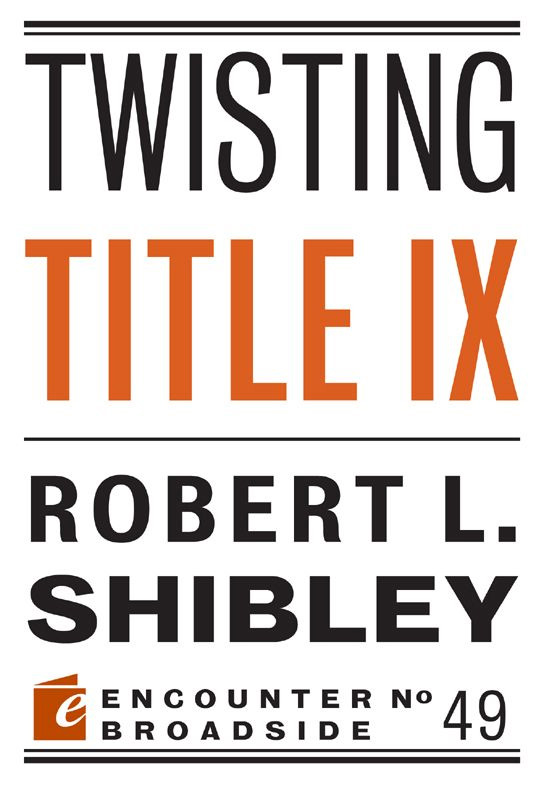 Twisting Title IX, by Robert L. Shibley. Encounter Books, 2016.
Twisting Title IX, by Robert L. Shibley. Encounter Books, 2016.
The story of the campus kangaroo courts pushed by the federal government onto (often willing) college administrators. These courts judged student sexual-assault cases. The regular courts have found that these campus courts had insufficient due process, often not allowing cross-examination. The Trump administration threw out and replaced the Obama administration “guidance” letter that fostered these kangaroo courts, but Biden promised during his 2020 campaign to restore the Obama administration letter.
“The Unholy Alliance of College Administrators and Left-Liberal Activists,” by Benjamin Ginsberg. Modern Age, Summer 2017.
Political scientist Ginsberg writes, “It is important to understand that such concepts as safe spaces, microaggressions, and trigger warnings are not examples of the hypersensitivity of coddled college students as they are sometimes made out to be by the press. Instead, these ideas are designed to stifle free discussion and to block criticisms of left-liberal dogmas by declaring any and all questions about progressive political beliefs and their adherents to be illegitimate and intolerable. Even the mildest comment presenting a possible challenge to left-liberal orthodoxies will be labeled microaggressive, a threat to the safety of the campus and, accordingly, utterly impermissible. For example, the seemingly innocuous claim that “America is a land of opportunity” has been deemed a microaggressive or a microinvalidative allegation that racial minorities are unable to succeed because of their own shortcomings and not the institutional barriers designed to block their efforts. Hence, say politically progressive groups, the phrase should never be uttered on campus. So much for the idea that colleges are bastions of intellectual freedom. ...
“On many campuses, though, administrators have forged what amount to tactical alliances with local activist groups and are unwilling to take issue with even the most outrageous claims voiced by campus progressives. ... Like bureaucrats of all stripes, equity administrators are constantly on the lookout for opportunities to wield influence, secure larger budgets, and take on more staff. One way to accomplish these goals is through the promulgation of new rules that create new offenses to police and more potential offenders to investigate.”
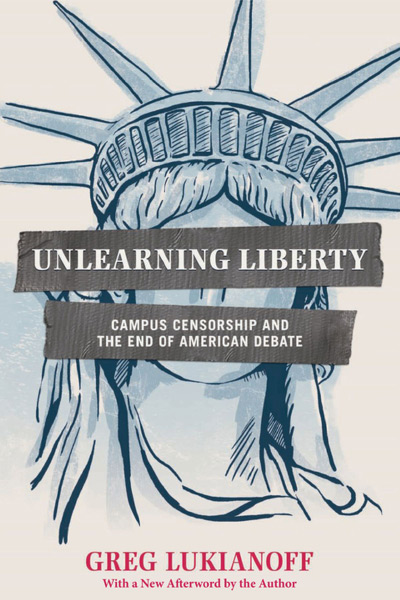 Unlearning Liberty: Campus Censorship and the End of American Debate, by Greg Lukianoff. Encounter Books, 2014.
Unlearning Liberty: Campus Censorship and the End of American Debate, by Greg Lukianoff. Encounter Books, 2014.
Encounter Books: “For over a generation, shocking cases of censorship at America’s colleges and universities have taught students the wrong lessons about living in a free society. Drawing on a decade of experience battling for freedom of speech on campus, First Amendment lawyer Greg Lukianoff reveals how higher education fails to teach students to become critical thinkers: by stifling open debate, our campuses are supercharging ideological divisions, promoting groupthink, and encouraging an unscholarly certainty about complex issues.
“Lukianoff walks readers through the life of a modern-day college student, from orientation to the end of freshman year. Through this lens, he describes startling violations of free speech rights: a student in Indiana punished for publicly reading a book, a student in Georgia expelled for a pro-environment collage he posted on Facebook, students at Yale banned from putting an F. Scott Fitzgerald quote on a T shirt, and students across the country corralled into tiny “free speech zones” when they wanted to express their views. ... Lukianoff goes further, demonstrating how this culture of censorship is bleeding into the larger society.”
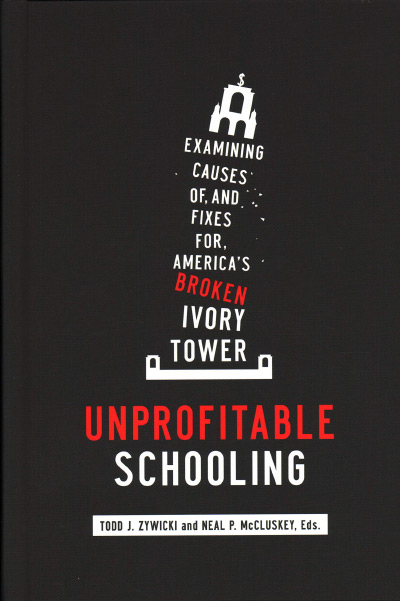 Unprofitable Schooling: Examining Causes of, and Fixes for, America’s Broken Ivory Tower, ed. by Todd Zywicki and Neal McCluskey. Cato Institute, 2019.
Unprofitable Schooling: Examining Causes of, and Fixes for, America’s Broken Ivory Tower, ed. by Todd Zywicki and Neal McCluskey. Cato Institute, 2019.
Exploring the history of issues such as federal student aid and administrative bloat, Unprofitable Schooling offers solutions to reverse the trend of increasing higher education costs and decreasing quality.
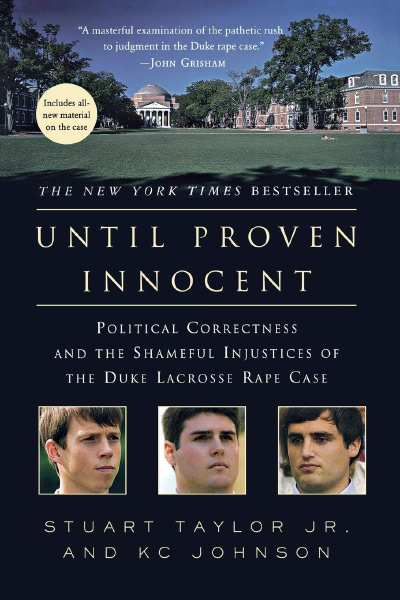 Until Proven Innocent: Political Correctness and the Shameful Injustice of the Duke Lacrosse Case, by Stuart Taylor Jr and K.C. Johnson. St. Martin’s Griffin, 2008.
Until Proven Innocent: Political Correctness and the Shameful Injustice of the Duke Lacrosse Case, by Stuart Taylor Jr and K.C. Johnson. St. Martin’s Griffin, 2008.
Jeffrey Rosen describes the book as a “riveting narrative” and says that “Taylor and Johnson have made a gripping contribution to the literature of the wrongly accused. They remind us of the importance of constitutional checks on prosecutorial abuse. And they emphasize the lesson that Duke callously advised its own students to ignore: if you’re unjustly suspected of any crime, immediately call the best lawyer you can afford.”
John Grisham writes, “Brutally honest, unflinching, exhaustively researched, and compulsively readable, Until Proven Innocent excoriates those who led the stampede—the prosecutor, the cops, the media—but it also exposes the cowardice of Duke’s administration and faculty. Until Proven Innocent smothers any lingering doubts that in this country the presumption of innocence is dead, dead, dead.”
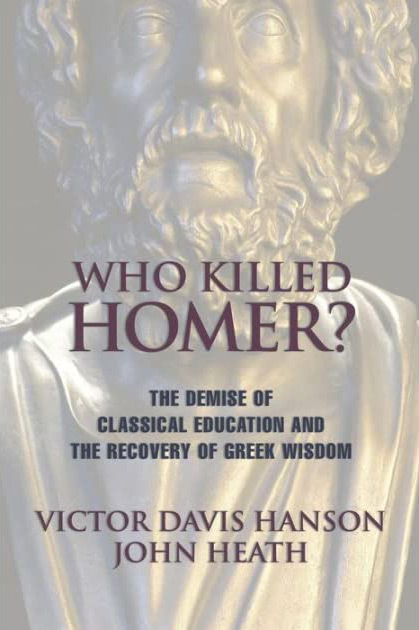 Who Killed Homer?: The Demise of Classical Education and the Recovery of Greek Wisdom, by Victor David Hanson and John Heath. 2nd ed., Encounter Books, 2001.
Who Killed Homer?: The Demise of Classical Education and the Recovery of Greek Wisdom, by Victor David Hanson and John Heath. 2nd ed., Encounter Books, 2001.
This book is important not so much for its proposal in chapter 5 for reform of the entire university, as for its proposal to revive and revitalize classics. The authors propose that classics professors convey to students what classical works such as Homer’s Iliad and Sophocles’ Antigone meant to the ancient Greeks who heard them, rather than, as reviewer Ralph E. Doty puts it, fitting them “to the Procrustean bed of this year’s academic fad.”
Hanson and Heath write, “Classicists now, along with the best social constructionists, moral relativists and literary theorists in the social sciences and comparative literature departments, ‘privilege,’ ‘uncover,’ ‘construct,’ ‘cruise,’ ‘queer,’ ‘subvert,’ and ‘deconstruct’ the ‘text.’”
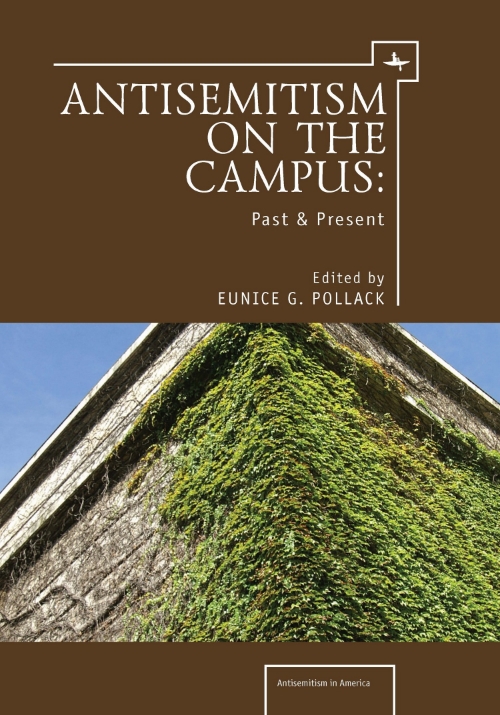 “Why University Administrators Tolerate Antisemitism,” by Benjamin Ginsberg. In Anti-Semitism on the Campus: Past and Present, ed. by Eunice G. Pollack. Academic Studies Press, 2010.
“Why University Administrators Tolerate Antisemitism,” by Benjamin Ginsberg. In Anti-Semitism on the Campus: Past and Present, ed. by Eunice G. Pollack. Academic Studies Press, 2010.
Ginsberg writes, “[One of reasons for the solicitude shown by administrators toward activists and minority groups] is that this alliance can, in several ways, help administrators to bolster their own power vis-à-vis the faculty. ... [M]ost professors . . . are generally reluctant to oppose programs and proposals that are presented as efforts to foster campus equality, diversity, multiculturalism, and the like. ... [U]niversity administrators will often package proposals designed mainly to enhance their own power on campus as altruistic and public-spirited efforts to promote social and political goals, such as equality and diversity, which the faculty cannot oppose. This tactic can succeed if and only if administrative proposals are endorsed by the school’s political activists, as well as spokespersons for the women’s groups and various racial and ethnic groups. ... For this reason, administrators view these coalitions of minorities and activists as important allies and frequently work to retain their support with symbolic and material rewards. ... It almost goes without saying that university administrators ignore the absence of ethnic and ideological diversity in their schools’ Middle East studies programs. Since such programs are usually allied with and supported by the left-liberal campus community, the question of diversity does not apply to them. Much the same story can be told about campus speech and civility codes. ... The campus Left is willing to declare that even the most blatantly antisemitic activity is actually anti-Zionist. ... Given a choice between nurturing their own career interests and objecting to antisemitic, oops, anti-Zionist rhetoric, many administrators choose the former.”


